#Hong Kong visual art
Explore tagged Tumblr posts
Text

Happy Qixi Festival ✨ We wish you a lifetime filled with love.
#a summer's end#wlw#lgbt#illustration#lgbtq+#oracle & bone#visual novel#indie game#original art#f/f#traditional art#traditional drawing#sam wong#michelle chueng#a summer's end - Hong Kong 1986#original character#ink drawing#art sketch#line art#watercolor#七夕#qixi festival#asian lgbtq#lgbtq artwork
583 notes
·
View notes
Text
Year of the Dragon 2nd piece — I wanted to match the 2D styles of the first one in full 3D, and show the details of the character up close. The tricky part was getting the dragon tail to move in 3D, and the rest were just a matter of time to put everything together
#art#3d#dragon#year of the dragon#yearofthedragon#lunar new year#lunar new year dragon#lunar new year 2024#3d animation#concept art#visual development#vis dev#indie animation#sci fi#hong kong#fantasy#kung fu#kung fu cinema#dungeons and dragons#drawing#anime#cel shaded
8 notes
·
View notes
Text
Magenta drawings for life size cutouts in my exhibition. The exhibition is closed already though in case you were wondering.




And here’s what they actually look like




#magentapink#oc art#oc life size cutout#exhibition#magentapink exhibition#magentapink art#digital art#procreate art#procreate drawing#digital drawing#digital illustration#procreate illustration#procreate#magenta#magenta heroverse#magentapink heroverse#magentapink by pui pui exhibition#hong kong visual arts centre
3 notes
·
View notes
Text




AGNES B - TARA EXHIBITION HONG KONG 2021
#agnes b#tara#exhibition#hong kong#k11#welovethesea#sustainability#design#art piece#portfolio#visual merchandising#installation#wall painting#event
0 notes
Text

Neon-Soaked Comics: Striking Artworks by Kongkee
Kongkee, aka KONG Khong-chang, is a visual artist and animation director who spends his time between London and Hong Kong creating vibrant pieces with a distinctive neon-soaked aesthetic. His work blends elements of cyberpunk and traditional Chinese art, resulting in a unique visual landscape that feels both nostalgic and refreshingly new.





#kongkee aka kong khong-chang#artist#art#neon-soaked comics#artworks#london#hong kong#cyberpunk#traditional chinese art
101 notes
·
View notes
Text
九龍城寨之圍城 | Twilight of the Warriors: Walled In (2024)
I've rewatched this movie more than once, since seeing it in theatres back in August, and each time was just as good as the first if not better. Given that, I now have many thoughts so I'm subjecting y'all to listening to why you should watch it:
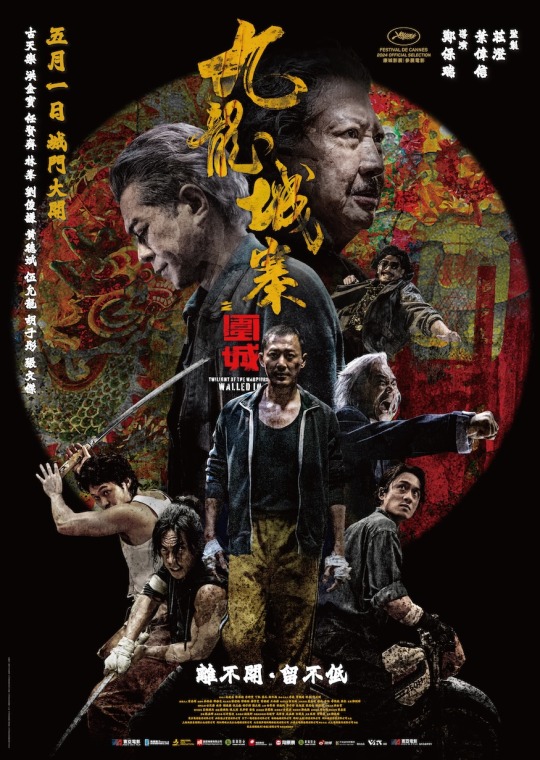
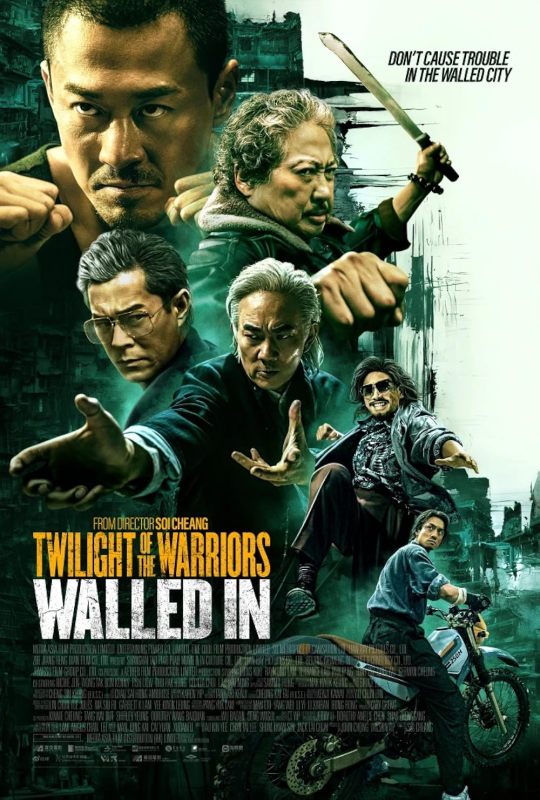
Twilight of the Warriors: Walled In (九龍城寨之圍城 or gau2 lung4 sing4 zaai6 zi1 wai4 sing4) is a martial arts action/crime film directed by Soi Cheang. It is an adaptation of the manhua City of Darkness by Andy Seto, and its source novel of the same name by Yuyi. The film's cast has established Hong Kong names folded in with newer-generation actors, starring Raymond Lam, Louis Koo, Sammo Hung, Richie Jen, Terrance Lau, Philip Ng, German Cheung, and Tony Wu (Aaron Kwok gets a cameo role, too).
At a broad glance, the movie follows several major triads in 1980s Hong Kong and their power struggle to control the Kowloon Walled City (a densely populated urban enclave, which for decades evaded direct governance by either the British colonial or Chinese powers in the area). We're introduced to the KWC and the triads' major players through the eyes of Chan Lok-Kwan (Raymond Lam), a man fleeing Vietnam and attempting to make a life for himself in HK. He winds up seeking refuge in the KWC, and comes to call both the city and the people he meets in it a home worth defending.
The narrative itself is not the most complex, but if you enjoy '80s Hong Kong films in these genres, it's solid fare and a harkening back to that decade. All the major themes like brotherhood (and brotherhood vs blood), vengeance, and struggle with conflicting loyalties are there, alongside an internal search for identity and belonging within Hong Kong. But the highlight in it is that the plot connects feast after feast of utterly stunning fight choreography, made all the more impressive by the fact that, according to Louis Koo, quite a few major cast members had never filmed this kind of action before. All their training was done just for TotW, and oh, does it pay off. I can't make good gifs, so you'll have to watch and see for yourself. It's not action for action's sake, either; listening to the head stunt choreographer discuss how different characters' fighting styles were crafted shows off how fight scenes aren't breaks in the story, they tell the story, and deepen our understanding of the characters.
The setting of the Kowloon Walled City truly makes the action in TotW stand out. It's a unique space to stage all these major fights, as the KWC's buildings at the time were packed together close enough to resemble a singular block from the outside. Once inside, it's a stacked, dark maze of uneven paths, stairs, and rickety roofs, with electrical and television cabling snaking over/around/through everything. Fight scenes in these streets feel thrillingly claustrophobic, with lots of acrobatics and near-dodges as characters navigate these tight alleys of the KWC. Each impact as a character goes flying into a wall, or is launched down a flight of stairs or onto a roof, is wonderfully visceral to watch.
All credit and hopefully awards are due to the production and set design teams for their work, in crafting this environment for the story and its fights. The visual/spatial representation of the KWC is the film's other glorious highlight, alongside the choreography. Whole streets of the KWC were recreated for this, filled with every mundane, period-accurate detail from the lives of ordinary people who would have lived there. It's impossible to catch all the intricacies put into making the KWC come to life again onscreen, just from watching the film. Shots like the credits sequence offer close-ups of harder-to-see details, and videos like a tour of the KWC set by Terrance Lau, acting as his character Shin, show off things from the drinks in the fridge at the corner store to the scribbled writing on the walls by the public taps. This film was designed with a drive to faithfully represent what the Kowloon Walled City had been like, how it looked when it was lived in, and they achieved it to an incredible degree.
That dedication extends to more than just the sets, though. The emotional core of TotW revolves around the KWC's inhabitants, and how they were the ones who made the city what it was, a home for about 35,000 people at a time. The film doesn't treat the KWC as just an eye-catching location to stage some fights; its characters might be fictional and overloaded with jianghu powers, but it goes out of its way to show how ordinary people might have lived, worked, and socialized within the historic city. It shows off why, despite its (not unwarranted) dark reputation, so many chose to live in a place that was once the densest urban center on the planet.
And this brings us to the acting, because the cast all do a very good job bringing their characters to life as the heart of the KWC. Louis Koo is fucking fantastic and arguably the scene stealer of the film as Cyclone, the triad leader in current charge of the KWC. He's grumpy, magnetic, and dangerous when he must be, but he also cares so very, very deeply about the inhabitants within his jurisdiction. Terrance Lau's Shin acts as his charismatic and capable right hand man, as well as protégé to Cyclone, befriending Chan Lok-Kwan and helping him become accustomed to life in the KWC. These two, along with the snarky Twelfth Master (Tony Wu) and the masked + imposing AV (German Cheung) become a quartet with great chemistry and friendship, the next generation to watch over and protect the Kowloon Walled City. Outside the KWC cast, antagonist figures like Sammo Hung, Philip Ng, and Richie Jen's characters are intimidating and compelling as threats to the city, and the lives people have etched out within its walls.
All of these things put together, and Twilight of the Warriors is a deeply fun, enjoyable, and rewatchable film (so good, in fact, that Hong Kong has submitted it as its nomination for the 2025 Oscars). The movie doesn't lose its emotional throughline in the promise of an action-packed ride it fully delivers on, and it uses its narrative, setting, and choreography to pay tribute to an earlier era of Hong Kong, as well as highlight + humanize a piece of the region's history that might not be quite as well known to some.
(The Kowloon Walled City was demolished and its inhabitants relocated in 1993. The area where it once stood is now a park, with some historic buildings preserved. If you're curious about people in the KWC before demolition, City Of Darkness: Life In Kowloon Walled City (1993) by Greg Girard and Ian Lambot is a collection of photographs and first-hand recountings from residents, recording their lives and stories. I'm in the midst of reading it right now.)
If anything I've said has piqued your interest whatsoever, I say to give Twilight of the Warriors a try, if you have a free two hours to spare. Something in it will be worth it for you. And if I've failed to convince you with any of this, or you need one more push, here's the trailer for the film:
youtube
And if I did manage to actually get anyone to seek out this movie, please tell me! I'd love to know your thoughts.
#hi i am NOT NORMAL about this movie come listen to me ramble about it!#twilight of the warriors: walled in#九龍城寨之圍城#ashton originals#ashton's recs
127 notes
·
View notes
Note
I'm writing a scene where a cultivater (chinese martial artists who fights ghosts) falls in a forest and I'm trying to figure out how someone who fights on rough terrain would train to fall. I tried looking at martial art/parkour/stunt man tutorials, but I feel like a lot of the basic techniques (rolling, and slapping the ground to distribute weight) wouldn't work well on uneven ground. I also tried looking at hiking advice but they just say to fall on your pack. Any insight?
Chinese cultivators don’t fall, they choose to reacquaint themselves with the ground.
That sounds like a joke, but the best way to understand Chinese cultivators and Chinese fantasy media is to realize that martial arts are the gateway drug to magic. And that will get you into a lot of trouble if you follow that all the way into Martial Arts Give You Superpowers, which is both the outgrowth of the western understanding of Chinese culture and a trope rife with orientalism. Cultivation seems simple on the surface when you’re watching Chinese media, but it’s more than martial arts, it’s more than religion, it’s more than mythology, (though it is all of those too) it’s a genuine transition into metaphysics that reorients how we understand and interact with the world around us. The concepts we see in cultivation come from real martial arts philosophy that you find in Tai Chi, Shaolin, and most other Chinese martial arts. They come from real religions including Daoism, Buddhism, a healthy dose of Confucianism, general mythology and mysticism from a wide range of subcultures, and, to an extent, Animism. If you aren’t doing your reading with the Eight Immortals, Journey to the West, The Legend of the White Snake, and others then you should dig in. I also really suggest watching the live action C-Dramas whether they’re true Wuxia or more Xianxia idol dramas (and in this case the idol dramas are better because the action is slower) so you can acquaint yourself with the stylized martial arts portrayals, a wide variety of choreography, character archetypes essential to motif based storytelling, and the most important aspect of all—wire work.
Understanding and conceptualizing stunt action done on wires is essential when you’re trying to visualize and create action scenes in any East Asian genre. Your first instinct might be to dismiss the stylized movement as unrealistic (it is) but remember that it’s also genre essential. Hong Kong action cinema has a very specific feel to it that’s very different from the way Western cinema structures and films their fight scenes. Even when you’re writing, you’ll want to find ways to imitate it through your visual imagery on the page.
Probably the best way to contextualize cultivators is that they’re wizards who do martial arts. They’ve learned to transcend the limitations in our understanding of reality through knowledge and study to perform superhuman feats. How superhuman? Well, it gets wild. They can be anywhere from Crouching Tiger, Hidden Dragon/Who Rules the World fly through the trees levels to Shang Tsung’s “I’m going to slam my hell reality into your normal reality because commuting to work is too much of an inconvenience.”
Which is to say, they don’t always fight ghosts. Sometimes they fight other martial artists, sometimes they fight other cultivators, sometimes they fight demons, sometimes they fight gods, and sometimes they fight incredibly overpowered monkeys. They’re often monks living in seclusion on a mountaintop, but not always. Cultivation is more of a state of mind. Anyone can do it if they learn how to absorb spiritual energy from the world around them through meditation and breathing exercises. Gods cultivate. Humans cultivate. Animals cultivate. Remember, the demons and the ghosts cultivate too. Sometimes, your master gets reincarnated as a demon. Sometimes, you do. The amount of wacky spellcasting you can do is dependent on how much energy you’ve cultivated, which is dependent on how old you are and how good at cultivation you are. Using the power means you need to cultivate more energy, the greater the spell or difficult the battle then the more energy is lost.
This is important to the question of: how does a cultivator fall?
Metaphorically? Existentially? Physically?
When we’re talking physically, wire work becomes very important. Think of your cultivator as being on wires. If they have the knowledge and understanding to do it, they can slow their own fall through the air to land harmlessly on the ground or twist over like a cat and launch themselves back off the ground to fly at their opponent in a counter attack. If they have the knowledge and understanding, they can teleport. If they lack the knowledge and understanding or want to trick their opponent, they can hit the ground like a sack of potatoes. If they’re relying on basics, they can also smack the ground to counter and spread out the impact then use the momentum from that fall to roll back onto their feet. They’ll do it no matter what terrain they’re on because it’s a basic technique that’s trained into their foundation to the point it’s a reflexive action. Any force distributed away from, and reducing impact on, important body parts like your spine is better than nothing. It’s better to sacrifice your arm than be paralyzed. At its heart, that’s the point of the technique. If you’re able to walk away with a functioning spine, it’s done its job. Your shoulder hurts? That’s normal. Your arm is sprained or broken? Sucks, but that’s better than the alternative that is paralysis and death. For reference, learning to fall was the first lesson my Wushu instructor ever taught me. It is that basic.
A lot of the time when portraying cultivators in media, the goal is to show them as being beyond the limitations of standard martial artists. How vast the gap is between the cultivator and the average human is dependent on both the setting and the cultivator. So, the average martial artist who possesses superhuman talents but hasn’t dedicated themselves to a life of cultivation and cultivators who are new to the path are going to be on the rung below and more likely to be knocked on their ass. Cultivators in the mid-range are more likely to have crafted or trained in solutions to being knocked on their ass which put them in a less vulnerable position while recovering and empowered/enhanced their martial arts. Cultivators in the top tier are usually straight up masters at spellcasting, if they deign to fight at all. Gravity need not apply. Rember, the time it takes you to hit the ground and roll to your feet is time your opponent has to launch a counter attack or move to a better position. Also, it means you’ve taken your eyes off your opponent. This is bad enough against a normal human opponent. Against another mostly immortal or ancient magic user this risks a terrible outcome.
Cunning and strategy are both as important as skill. Wisdom, knowledge, and hard work outweigh talent and raw potential. You’ll have to decide how esoteric you want to be and what limits you want to set. I really urge you to do this because the danger of power creep is real and especially prominent here. A character’s growth in power is often linked to their growth in character or their arc, as they gain a greater understanding of themselves and the world around them their skill increases. The self-discovery/self-reflection/self-interrogation/intense suffering to reach enlightenment portion is just as important and intrinsic to the martial arts portion of Martial Arts Give You Superpowers. It’s easy to focus on the Superpowers or the Martial Arts parts of the equation and miss the genre necessity of character growth. This growth often happens through heaps of steadily increasing trauma. Or, failing to undergo that by being too powerful and thus unable to progress is the joke like it is in Qi Refining for 3000 Years. (Go to hell, Bai Qiuran, you hilariously overpowered monstrosity.)
The irony is that the trajectory in character growth is the same trajectory the average student experiences when practicing martial arts. The only difference is that the power arc is inflated. This includes overcoming ingrained truths that you believe about yourself, about your own abilities, what you believe yourself to be capable of (both good and bad,) about your biases toward yourself and other people, your biases about reality in general, your understanding of good and evil, the potential upending of right and wrong, and facing the greater complexity found in the world at large. The stripping away of these illusions, coming to terms with uncomfortable realizations in a more complicated world, and the gaining of new understanding and confidence are vital to that growth.
Skill isn’t just represented in the power creep, it’s also found in a character’s sophistication and complexity in their approach to combat and life in general. Their awareness both of themselves and of other people, their ability to read intentions, their predictive abilities, their complexity in initiating their own strategy and tactics while also recognizing and countering the plans of others. It’s their insight into human nature and their cunning. It’s not enough to be powerful. The world is full of powerful people and not so powerful people who have the capacity to be just as dangerous. This isn’t Goku and Freeza slamming into each other while the planet explodes in nine minutes. You also need to be smart. It’s also not about being a better person. It’s about being a self-aware person. A person who is self-actualized. Monkey’s growth is in his awareness of the world around him through his experiences and in approaching problems differently rather than becoming less of a little shit. If you grow up in the West, one of the issues you’re going to face is thinking of these hurdles as materialistic rather than emotional or intellectual.
A lot of Western media misinterprets the concepts of “giving up” as physical sacrifice. One of the popular examples is physically sacrificing the person we love. In order to have enlightenment, we must be separated from them. We can’t physically be with them anymore. Whereas under a Buddhist structure, what we are actually sacrificing is our own ignorance, our own preconceptions, and beliefs that keep the world comfortable. Under this structure, we’re sacrificing our preconceived notions of who our loved one is. The person that we invented when we first met and we must force ourselves to come to terms with who they really are. The outcome of this isn’t necessarily going to be bad, but it’s still painful. The person we think we love could be perfectly wonderful. However, they’re not who we imagined. If we choose to hold onto the illusion we created, to ignore the realization that the illusion is the person that we love, we’ll only end up causing ourselves and our loved one more pain. We must fall in love with them all over again. Coming to terms with that is painful. All pain comes from ignorance. In sacrificing, letting go of, or overcoming our ignorance, we grow.
These are the emotional, intellectual, and spiritual challenges necessary for a cultivator because they allow the cultivator to level up. Yes, level up. Whether this is coming from the influx of gaming culture into media at large or because the concept synergizes with the Buddhist goal of progressing through the Six Realms toward nirvana, leveling up is how a cultivator’s increasing power is often depicted. Of course, once we reach the next level we can’t go back except by falling or failing and are no longer the person we once were. This then gets mixed in with Daoist principles of finding divine understanding by living in harmony with the universe. The more understanding we gain of the world, the more energy we can absorb as a result, but our original goals may be lost or changed in the process. If a character begins their journey on the path of revenge, their newfound contextualization of the situation that caused them immense pain may force them to give that revenge up or find they don’t want revenge anymore.
Failure is also an option and often a common part of the story. These stories usually follow characters through multiple lives and rebirths over hundreds and even thousands of years, especially if they’re also gods. This is the existential fall. The fall to the Dark Side. All our heroes are going to go through it at least once. This is also why a lot of Chinese media ends in tragedy with hope for the next round.
-Michi
This blog is supported through Patreon. Patrons get access to new posts three days early, and direct access to us through Discord. If you’re already a Patron, thank you. If you’d like to support us, please consider becoming a Patron.
479 notes
·
View notes
Text









+++++++++ Who is Kaws Some know him for his collaborations with Supreme, Nike and Uniqlo. Some know him for his Be@rbrick, Astro Boy and Elmo collectible figures. For others, he is an artist working across painting, drawing and sculpture. To all, he is a cultural icon.
KAWS was born Brian Donnelly in New Jersey in 1974. He chose the name KAWS as a graffiti tag during his teenage years, claiming that he liked the shapes of the letters. KAWS attended the School of Visual Arts in New York. After graduating, he worked as a background painter for animated cartoons including 101 Dalmatians and Doug. It was during this period that his street art practice began in earnest. KAWS would remove posters from the city walls and draw over them at home before returning them the next day. It brought him to the attention of the art world, the public and major brands.
In 1999 KAWS shot to fame with the first of his limited-edition vinyl toys: COMPANION. Inspired by Mickey Mouse, COMPANION would become one of his most important characters. He graced the 2012 Macy’s Thanksgiving Day Parade as a 40-foot-long balloon, and occupied Victoria Harbour in Hong Kong as a gigantic floating inflatable in 2019. Others, including CHUM, KURF and BFF, would join his pantheon.
Over the course of his career, KAWS has appropriated a variety of cartoons. They include The Simpsons, SpongeBob SquarePants, Snoopy and characters from Sesame Street. KAWS endows them with his trademark features, including skull-and-crossbones heads and crossed-out eyes. In doing so, he seeks to imbue them with human sensibility, rescuing them from the world of fictional happy endings. His characters are flawed, fragile beings that reflect our own emotional states.
Like Andy Warhol, Jeff Koons and Takashi Murakami, KAWS works at the interface of 'high' and 'low' culture. His practice asks whether there is any meaningful difference between the two worlds. While his paintings have commanded some of his highest auction prices, his work also populates album covers, fashion shows and store windows. His collaborators have ranged from the Museum of Modern Art, New York, to Kanye West and Kim Jones. Perpetually expanding the parameters of art, KAWS remains one of the most powerful voices in 21st-century culture.
23 notes
·
View notes
Text
Alberto mielgo

Alberto Mielgo is an artist, movie director, and animation professional. He was born the 29th of April 1979 in Madrid, Spain, where he was born and raised. He then traveled to Paris, Tokyo, Berlin, London and Los Angeles where he now lives and works.
Mielgo’s personal purpose in his art is to “bring a better and smarter animation for a more target audience.” He has received a Prime Time Emmy award in the year 2013 and then an Annie in the same year under the title of best production designer for the movie “TRON UPRISING”
Alberto Mielgo has worked on a plethora of different projects during his career, but my personal favourites are Jibaro and The Witness for the show Love Death & Robots, and his concept art for the movie Spiderman: Into the Spiderverse.

The Witness
The Witness is a short film Mielgo made for the Netflix series Love Death & Robots. He describes it as being one of his most personal films.
The Witness starts with a woman looking out from her hotel window in Hong Kong. From her window she sees a disturbing scene unfold; a ma from the hotel opposite of hers kills a woman that appears to look exactly like her. After witnessing this murder, the woman tries to get as far away as possible contacting a friend or colleague “Vladimir” to let him know she’s coming over. She arrives at this sex-filled sabbath party where she seems to work at. The unnamed murderer follows her in and proceeds to chase her all the way to his own hotel room. In the end, the woman manages to kill him out of self defence, before she peers out the window to see a man peering out of the hotel room opposite of her, who is identical to the dead man that lay on the floor in front of her.

The style of this film is incredibly captivating, each frame is so packed with visual information and detail. The background design is very thought out; cluttered and packed but somehow always guiding the viewers’ eye to the character in the scene. One thing I noticed in this short film is how most scenes seem to be desolate, there are no characters other than the 2 individuals participating in the chase. There is of course an exception, the brothel scene is the only scene where there appears to be more than two people interacting with each other. Another interesting element of the cinematography in this episode is the camera work; the camera seems to shake and move to give the audience the impression that they are in the same stressful situation as the characters.


#alberto mielgo#love death and robots#netflix#spiderman#spiderman into the spiderverse#animation#the witness#jibaro#artist study#art
13 notes
·
View notes
Text
Black Skin White Screens
Another email response that I think might be useful here. Person was asking a question about why nobody cites Black film as influences: When Moonlight dropped nobody was talking about Clockers even though there were clear visual and dramatic elements referenced. Instead everyone (the filmmakers, critics, etc) was talking about French and Hong Kong cinema. So people even deny Spike's influence.
But, I think you might be mistaking a symptom for the disease. Tons of Black filmmakers were influenced by nonBlack filmmakers. French Impressionism & German Expressionism influenced Julie Dash; Charles Burnett loved British Kitchen Sink cinema; Bradford Young and I had a great convo about Apichatpong Weerasethakul one time; Haile Gerima almost killed me bc I interrupted a screening of Solaris by one of his GOATS Andrei Tarkovsky 😂 Even John Akomfrah's affective proximity, which AJ loves to employ, is an evolution of Eisenstinian montage.
The difference is that most of these filmmakers were steeped in, trained in, and worked in Black film. They weren't working within the studio system (though Burnett would go on to work with Disney in the 90s). There were Black spaces from Studio Museum in Harlem to Performing Arts Society of Los Angeles. There was public funding for TV that Marlon Riggs, Chamba Productions, etc. were able to take advantage of. Now all of these programs are either severely underfunded or gone completely. I think this is the primary reason: There aren't that many (semi)autonomous Black film/cultural spaces left. And so there's no cultural push for such things.
All the money and attention is in white spaces. I know some filmmakers who either did a concept short for a feature or are in prepro on their first feature. The people around them have told them that they need to find European equivalents to their Black influences or else the money and attention will dry up. It's a structural thing. Two suggested comparisons that stuck out to me were Bill Gunn & Steven Soderbergh and Kathleen Collins & Maya Deren. These directors are not doing anything close to the other. It's just "scrappy indie director" and "known female director". I guess that's how things are commodified now.
Back in the 90s John Singleton went to Senegal to study under Ousmane Sembène. Part of the conversation is in Manthia Diawara's Sembéne: The Making of African Cinema. Diawara screened a bunch of cut footage from this conversation a couple years back but I don't think it's online. So literally 30 years ago there was still a connection to the past. What you're describing is a recent development.
So much of the last decade of Black cinema is animated by liberal identity politics and white guilt. from How They See Us to Birth Of A Nation. Even films that aren't so explicit about the white gaze like Moonlight are still affected by this phenomenon. It's not shocking that it won best picture after #OscarsSoWhite nor is the volume of Black cinema represented that year surprising. I have my suspicions that Barry was affected by the same antiBlack forces my friends are fighting now. He was tweeting about Clockers in the months preceding production.
The industry is in flux right now + the transition from Obama to Trump (which we're still in btw) are all at play here. Film, especially Black film, is in retreat right now. The best we can do at this moment is be torch bearers of our lineage. I always feel like I'm mopping the ocean but every now and then a legend messages me a thank you or a new subscriber shows their appreciation.
In this climate of "Black firsts" (well firsts in white spaces) it's good to see you articulate how you want to build on the past. Being the Black 101st means that despite colonialism and slavery and Jim Crow and prison and everything else, nothing can stop the force of the Black camera and that should be honoured and celebrated.
18 notes
·
View notes
Text

It's your move
December 28 is Sam's birthday. Give her a ring! ☎️
#a summer's end#wlw#lgbt#hong kong#visual novel#lgbtq+#illustration#oracle & bone#indie game#original art#sam wong#ase#a summer's end - Hong Kong 1986#disco#neon
179 notes
·
View notes
Text
Thoughts on SANABI
So. I want to talk about SANABI.
For those of you wondering, SANABI is a Korean indie platformer released in November 2023. The platforming revolves around a grappling hook mechanic that you use to swing around levels. In a dystopian cyberpunk world, you play as the General(1), and you’ve been tasked with hunting down an elusive entity known only as Sanabi; it’s responsible for the disappearance of the entire population of Mago City, an independent city run by the conglomerate Mago Group. You, along with a hacker named Mari, slowly uncover the secrets around… pretty much everything, but Mago Group especially.

While the mechanics, visuals, animation, and OST are great, what really grabs my attention is the game’s story. The storyline is absolutely fantastic, I love it to bits, and I need to talk about it or else I’ll explode. It’s unfortunate that the game isn’t well known; one of the reasons I’m talking about it is because I want more people to know about this gem, gosh darn it! (And it'll be a nice change of pace from my other long posts, which are mostly me being angry and insecure respectively.)
First, a quick rundown of non-spoilery things. All the juicy stuff is behind the cut.
Many Western cyberpunk stories heavily feature elements from Japan or Hong Kong (such as Japanese corporations or the aesthetic of the former Kowloon Walled City), and some of these stories have been accused of being “techno-orientalist” by promoting fears of East Asian dominance in the West. Yikes. However, SANABI utilizes what can best be described as… KOREAN CYBERPUNK! The game combines elements of traditional Korean culture with cyberpunk, which in my eyes makes for a refreshing take on the genre. The enormous neon signs are Korean, the characters wear traditional Korean clothing, and the architecture incorporates Korean elements. It’s all super great to look at. (And as someone who’s partially Korean, it brings me personal joy.)
The characterization and interactions in the game are excellent; sometimes the dialogue is strange or clunky, but I’m chalking it up to translation and localization issues and I’m not blaming the team for that. This game is heavy on cutscenes, but I didn't mind because the story is so well written; in fact, they’re almost a relief because gameplay requires a lot of concentration and cutscenes provide an opportunity to unwind.
I’ll mostly be talking about the storyline, since that’s basically my specialty as a writer and all, but I may dip into talking about other aspects of the game, such as the visuals or music; I will also be looking at the cultural and economic context behind the game, which (if you ask me) explains a lot about Korean media in general.
Content warnings for terrorism as well as in-depth discussions of death and grief. I will post screenshots of the game, a few of which are quite bloody (rendered in pixel art).
One last thing. SANABI is one of those games where it’s best to go into it knowing as little about it as possible due to the nature of the story. If you have not seen or played SANABI, I highly recommend playing the game or watching a playthrough before reading this post. (If you’re looking for playthroughs, I recommend Dan Floyd/PlayFrame’s Let’s Play, which can be found here. It was actually a one-off before Dan decided to expand it to a full playthrough, and it’ll probably be complete before this post goes up, because I am very predictable.) (Edit: Yup.) I do not wish to rob anyone of that first-time experience. If you want to read this post before checking out the game, I can’t stop you, though I strongly dissuade you from doing so.
Laaast warning!
When you boot up the game, you’re greeted with the main menu (because of course that’s where I’d start, not by immediately jumping into the game proper or anything). The menu song, “SANABI,” utilizes a distinctive melody that we’ll hear throughout the game—a leitmotif, if you will. I will make sure to point out this little motif whenever it appears given how thematically important it is. By the way, this game’s soundtrack is excellent, so expect me to ramble about it every so often.
Anyways, let’s start the game, shall we? The game offers four difficulty modes, the hardest of which you unlock after beating the game. The easiest difficulty makes you invincible and is for the casuals who are just here for the story, and that’s perfectly fine. Of course, my sibling saw this and immediately said, “Who would play the game with invincibility?” (They’re a Celeste speedrunner, you see. They’re 100% a hardcore gamer.)
Okay, let’s start the game for real.

The game starts with a girl telling her father, among other things, that “Getting all the way to the end is not important!” This phrase is a motif throughout this game (aka Arc Words), so remember it.
The General wakes with a start, so apparently what we just saw was a dream/vision. When he checks on his daughter, she runs over and hugs him and it's the most adorable thing ever.

The animation and designs do a lot to convey character in this game. The General's outfit is black and red and the brim of his hat always cover his eyes, which gives him that mysterious badass look. (By the way, that hat is called a jeonrip and was historically worn by Korean military officers, so this outfit should immediately tell its Korean audience, as well as anyone who watches enough historical K-dramas, what this guy’s job is.) He walks, and runs, using a steady, professional gait. His daughter, in contrast, is dressed in a bright yellow and red hanbok. She bounces up and down, practically radiating energy, and she has sparkles coming off her. It's all very cute.
Strangely, the game offers dialogue choices in this prologue. We don't see this anywhere else in the game except for one scene far later, which I’ll get to when we get there. This is probably a relic of an earlier iteration of the game that had dialogue choices, but I'm glad they scrapped it. It suits this game better.

The daughter wants to play with a box of “fun objects,” so she and dad head into their small, remote shack.(3) The interior is based off that of traditional Korean homes, or hanoks; feel free to compare to this image. The furniture has a distinctly Korean feel, down to the blankets stacked against the wall and the black lacquer closet decorated with designs of birds and mountains. I also spot lots of vases and what looks like calligraphy on the wall, as well as several medals and certificates.
The daughter rifles through the fun objects, aka her father’s military stuff, and says she wants to play soldiers with him. “Can I be the general? Can I?? I want to be the general!!” she cries, jumping up and down like she doesn’t have a care in the world. Her father immediately obliges, even letting her borrow his general’s Steel Tiger medal.
Our General has been tasked with rescuing Agent Raspberry from “the hill in the back,” which is filled with dinosaurs and lava; he’s the only one who can do it because he’s an “inbincible elite soldier.” Of course, there's no actual lava, and the General even points this out, but he’s a good dad, so he sets up a red visual overlay over the grassless areas. Might as well be the real thing.
This starts a fun tutorial that teaches basic gameplay, including how to use the Chain Arm, the grappling hook mechanic. I’ll skip over this part for the sake of time, but it's very cute. (You can pet a cat named Agent Meow, and if you don’t touch the “lava” while he’s watching, he applauds you—wait I said I’d skip over this part shoot—)
The General successfully “rescues” the raspberries and brings them back to his daughter. She’s asleep, but she’s drawn something for her dad.

To her we are the “invincible soldier.” Which is pretty sweet!
Our kid wakes up later and pulls out a walkie-talkie, which she had gotten earlier from the box of fun objects/military gizmos, but she's only brought one, whoops! So she gives the walkie-talkie to her dad and heads to the house to grab a second one.
The radio crackles to life, and the daughter says there’s a large clock in the house. That’s a bit strange. There's something written on it, and she reads it aloud.
“Sa… nabi. What's a Sanabi?”
The game starts off slowly, which is probably a large turn-off for people who want to cut straight to gameplay. This intro follows in the vein of Korean revenge films, where there’s often an introductory scene showing the protagonist going about their usual life with loving family members that the plot will take away from them, starting their revenge spree. I’ll discuss Korean revenge thrillers later on.
The General abruptly stands up, radio in hand.
“Love, listen to daddy. Get out of the house right now. RIGHT NOW.”
But she can’t hear him over the radio. He runs towards the house, only to be thrown back by an explosion—cut to black.
When consciousness returns, the world has faded to gray, and the only thing that can be heard is a distant ringing. The General slowly gets up, and a QTE prompts you to get him to slowly move towards the house. (More on QTEs later.) Turns out the house is completely destroyed, and the General falls to his knees.
Aaand smash cut to title! Welcome to the game.
I love the abrupt tone shift here. I'm willing to bet a lot of you were jaded enough to expect something to happen to the daughter eventually, but still! Darn. This shift reflects the General's outlook on the whole ordeal—he had a great life, with a great daughter, until all that was snatched away from him. Yikes.
17 days later, we’re in an extravagant office in a highrise building; most of the screen is dark, obscuring our view, and we can only see two robots standing next to a window. (This game plays with perspective in this way a lot, as you’ll see.) One of the robots, a bodyguard named Cheol(4), approaches someone we can’t see with the intent to kill him—only for a metal claw to attack from the darkness and completely wreck the guy. We all know who it is.
The other robot, who appears to be the boss of some kind of weapons company, panics and says they have information on Sanabi, but as it turns out, the General has already tracked those leads and found nothing. When the boss makes the mistake of asking what he wants, he grabs the boss and suspends them over a broken window; the boss offers all their money as compensation for whatever the General lost, and he responds by dropping them out a window.
When you take him to the door leading out of the office, he opens it, revealing a corridor lit by a flickering emergency light. The walls and pillars are covered in enormous rake marks, the paintings are askew, and the body parts of robots litter the ground. There’s a red haze in the air.

I love the environmental storytelling here. It’s efficient, for lack of a better word—with one glance you can infer what happened here. It’s a powerful mood-setter, too.
Now this right here is in line with Korea’s revenge thriller films, one of the country’s main exports besides rom-coms about shy teens and K-pop. This genre is native to our favorite peninsula, featuring brutal levels of violence, villains who are usually rich people, and an inept police force. Emotional catharsis not guaranteed!
I did a lot of reading to trace the roots of this trend, and over and over I came across the term han, a Korean concept that’s difficult to translate to English but can be described as a sort of grief or unresolved anger at societal injustices. The feeling can be traced back to Japan’s colonization of Korea and has been refined, if you will, by the Korean people being divided by the 38th parallel and the South subsequently being ruled by a string of dictators. So basically, the Korean fixation on revenge films comes from an innate anger at the unfairness of the world and the desire to lash out. Fun!
If you want more information about the historical context behind Korean revenge films, click here. And for more information about Korea’s long, often troubled history, click here or go to footnote #8 for the extra-long version.
Now I know what some of you are thinking. “Truthseeker/Thunder, you spent several months writing an essay about a boring game with a fridging that’s setting up a clichéd revenge plot? I’m so disappointed in you.” And to that I say, “Listen, this is one of the best games I’ve ever seen or played and I do not say that lightly. Just trust me on this, alright?” And those of you who are reading this and know what’s up are nodding knowingly or something. I dunno.
Anyways, back to the game. The General takes the elevator, telling the operator to take him to the first floor; the understandably terrified operator obliges. As the elevator slides down, it passes by rows and rows of similarly devastated hallways. To put it in Dan Floyd’s words, “We’ve been busy.”(5)
There’s a servant on the first floor who aims a gun at the General, but loses his nerve and runs for it. When you enter the lobby, the servant appears again. A thin laser appears that goes through both your bodies, and the servant is confused, but not for long. The laser fires, vaporizing half the poor guy’s body. You survive, though, presumably because the servant took the brunt of the blast.
An extravagantly dressed guy saunters into the lobby. This is Kang Seon(6)(7), and he has a gun for a head. This game utilizes rule of cool a lot, but never in a way that breaks immersion, at least for me. It’s one of the things I love about it.
Kang Seon kicks the servant-bot’s corpse and complains about, if I were to guess, him not opening the entrance. The characterization in this game is excellent, by the way, even for minor characters like this.
When the General attacks him, Kang Seon is impressed, excited to fight “someone who’s got chops.” It’s time to put your skills to the test.
My sibling (who’s played a bit of the game as of my writing this) felt the need to say that the timing of Kang Seon’s laser attacks was “extremely generous,” by the way. Don’t have much to add to that; this guy is the first boss you encounter in the game.
Once you defeat Kang Seon, he threatens to blow you up along with him, but a cannon blast from outside kills him. Leaving the lobby reveals a military helicopter parked outside. An officer is waiting for you—Colonel Baek.
At first the General isn’t interested in what he has to say, but Baek tells him, “Sanabi reappeared.” This intrigues our murderous, rage-filled, inbincible elite soldier and he gets into the helicopter. The boss slowly gets up from the pavement and tells Baek to shoot his comrade, but Baek shoots them instead.
Before I forget, I should probably mention the architectural style of the game—the classic cyberpunk look we all know and love mixed with traditional Korean architectural elements such as tiled roofs, dancheong, and a distinctive bracket structure. Those brackets painted with colorful patterns can be seen within the military HQ.

The General gets a mission briefing. Apparently Sanabi has resurfaced in Mago City, a city owned by a company known as Mago Group. The base wants to assign him a specific mission because he’s apparently the only one who’s ever met Sanabi in person.
Mago Group is a megacorporation reminiscent of chaebols, a Korean term used to describe enormous companies run by a person or family (Samsung Group is the largest of these). In South Korea, chaebols dominate politics and the economy and have enormous influence over the country. They’re essentially monopolies with close ties to the government and are comparable to Japan’s keiretsu.(8)
If you’re familiar with Korean media in pretty much any capacity, you’re probably aware that rich people, companies, or both often appear in an antagonistic capacity in such media. SANABI is no exception. Mago Group has some connection to Sanabi, but it’s not clear what exactly that connection is. At least not yet.
Another nifty fact: Mago Group is named after Mago, a creator goddess from Korean folklore. Is this a thematically appropriate name? We’ll see. Heck, I’d even argue that Mago Group’s logo—a triangle overlapping with a circle, resembling a mountain silhouetted against the sun—is also thematically relevant. Everyone jump on the overthinking train! Our destination is, um, I dunno. I hadn’t thought this far ahead. Aaaugh. I’m gonna curl up in the corner now.
The General agrees to start the mission, but only if he orders something called Operation Zero, which seems to be a big deal. He also plugs in a chip, which causes something called “S.O.S” to appear on the HUD.
Our General also wants to do some limb maintenance, and Baek directs him to the supply area. There we meet Major Song. Compared to the soldiers who stiffly salute the General, Song is a lot more laid back, slouching off the ledge she’s on to give a casual-looking salute. She’s much more relaxed but still respectful around our inbincible soldier than the other guys. This is because, as we will soon see, Song is utterly fearless and someone who is not to be messed with.
Song says the parts for the chain arm can’t be found on the base, since it’s pretty out of date, and she recommends her superior check the black market for parts. We also head into Training Ground #17, where we have our tutorial the second.
This tutorial is more comprehensive than the first one where we were dodging the “lava,” introducing how to fight enemies, dash after taking damage, etc. Unfortunately it’s also more boring because there’s no fake lava we have to avoid for our daughter. This seems to be some kind of design limitation that comes from having to introduce the player to concepts like fighting enemies that realistically won’t come up when roleplaying with our daughter, but it’s still not ideal.
We also have a training test at the end of the tutorial to evaluate how fast the player can navigate the course. If you beat it in under 26 seconds (the General’s old record), which is quite tricky, you get an achievement! The fastest I’ve seen it completed utilizes speedrunner methods.
After that, we return to Major Song, who’s heard about the whole Operation Zero thing and is skeptical. We don’t hear what exactly Operation Zero is, only that it’s presumably something that’ll deal with Sanabi. For that matter, we don’t know what Sanabi is either, only that it blew up our kid. Whatever Operation Zero is, it’s clear the General isn’t planning on coming back alive.
Song tells the General to leave behind what he wants to leave, and he pulls out a piece of paper. We saw him with the same paper earlier when he was issuing Operation Zero. Song picks it up and reads aloud, “Invincible.. the elite soldier…”
The General heads to his quarters and pulls out his Steel Tiger medal, which looks a bit scuffed. We flashback to a time when the Steel Tiger was pristine, where the General is explaining to his daughter that it’s a medal given to generals. The daughter hugs him and calls him the coolest in the world. We return to him in the base where he’s crying stoically, which is incredibly sad(9). Don’t pull on my heartstrings like that :(
Next up is the briefing. We’re now in a helicopter in Mago City airspace, and a hologram of Colonel Baek tells us something highly confidential: after a network blackout in the city, every citizen in the city vanished into thin air. It’s almost certainly Sanabi’s doing. We’re given the task of retrieving Mari, a member of an investigation team who’s sent a distress signal and reported she found information.
An artillery blast hits the helicopter, and the General prepares to jump out of it, but it crashes. We see the same scene from the very beginning of the game, complete with our daughter telling us again that getting to the end isn’t important. However, the memory—if it can be called that—seems a little off. The HUD seems a bit different, for one. And at one point our daughter, instead of giving normal dialogue, starts talking in censored boxes. That’s not how language works, kid!
Oh, and our S.O.S doesn’t work. Yippee.
We are a short distance outside Mago City’s gates. This is where the prologue ends and the game proper starts. It was a long journey, but we’re finally here, people! There are five more chapters to go. I have to analyze all of it. Lemme just add weirdly titled headers for my personal convenience.
Chapter 1: Program
And off we go!
Well, you probably know how platformers work. I don’t think I need to explain how you, as the Brigadier General, have to swing around and avoid stuff that will kill you such as the volt potholes (the red bits of floor). I do want to say, though, it is satisfying as heck (evidence: every time I cheer loudly after defeating a tricky boss or navigating a difficult area).
Once you reach the first gate, you encounter a speaker that says it’s best to evacuate the city. Huh. What is with this place, anyway? What happened to everyone? These are questions we will slowly unravel throughout the game.
Inside the first gate, we encounter turrets and robots. Mago City is suspiciously well armed, as we will soon find out. Yes, megacorporations having private armies are a genre staple, but seriously, why is there so much security? Yet another question to throw onto the pile.
Right after the General enters Mago City proper, we see a floating orange drone tailing him. This little guy’s name, we later learn, is Mufin. Not Muffin, Mufin with one F. I decided to investigate the original Korean, and its name is “머핀” (pronounced “meopin”), lit. “muffin.” So if this guy’s name is Muffin, why is its English name spelled with just one F? Who knows, it’s probably a small mistake. Trust me to get hooked up on a tiny detail like this. Moving on!
We can see Mufin make appearances here and there as we platform. Weirdly, I never catch these appearances while watching a playthrough, but while playing the game itself I was constantly like, “I see you there!” Does playing a video game make you hyper-aware of your surroundings or something? Probably. Definitely.
After a while the General decides to hide in an alley as Mufin passes by, then grabs it. Turns out Mufin is Mari’s drone, and it gives the General her coordinates. Off we go, then.
Some platforming/robot-destroying later, we find Mari hiding under a sack.

Quick note on Mari’s design: her clothes are blue and yellow. The daughter wore red and yellow clothing. Read into the color symbolism as much, or as little, as you’d like. For my part, I couldn’t tell you how much “Mari wears blue, which represents hope and the future in Korean culture” was an intentional design choice on the devs’ part; for all I know, they made her clothes blue because they liked the color. How much am I overthinking things? You be the judge!
Mari is terrified. At first she asks who’s there (the Brigadier General), then asks if we’re human (yes). The General tells her he was sent to protect her, but Mari has serious doubts on the capability of one person. After all, what can one person possibly do?
The General informs her that he’s killed all the murder bots(10), but this makes Mari freak out even more. Turns out there’s something beneath the floor of the city. Something very large and very hungry.
It’s a giant metal worm.
It erupts out of the ground, leaving behind a volt pothole where it chewed through the floor. Mari immediately hops onto Mufin, flies off, then returns to the General and shouts, “Why are you just standing there?!! Run!!” You should heed her advice, because the worm is now chasing after you.
After a narrow escape from the metal worm of death, our characters get a chance to relax. As it turns out, the network blackout we heard about earlier actually meant the city’s data has been wiped. Mari doesn’t actually know anything; she only said she had information because no one would’ve come otherwise.
I’ll add something real quick here. Throughout the game, Mari refers to the General as “mister.” A bit odd and overly formal for an English speaker, but we’ll have to turn to the game’s native language for the full picture. In the original Korean, Mari uses the term “아저씨,” romanized as ajeossi, to address the General. This term is used to politely address a man older than the speaker. If you’re wondering why I’m bringing this up, besides for a fun piece of trivia, it’s because I’m gonna bring it up later along with a longer explanation. You’ll see why when it comes up again.
So what’s the plan now that we have zero information to go off of? Luckily, Mari has a plan that involves… fishing?
We’re then shown a presentation of sorts that feature Mari drawing out pictures as she explains the plan. These are absolutely fantastic, not just because of the music that plays during these scenes (appropriately called “Mari’s Theme,” which also includes the SANABI leitmotif) but also because stopping to make drawings while explaining the plan is such a Mari thing to do.

Right, the characterization! Still love it. Mari is very talkative and energetic, especially in contrast to the quiet, no-nonsense General. In writer speak, placing contrasting characters next to each other like this is known as foiling. It’s a good technique is what I’m saying. I love my foils.
Anyways, Mari’s plan is to pull the Writ of Execution (the crusher’s official name) out of the ground using a crane hook, although the power source has to be disabled first. Unfortuntately, the worm’s power source is located in its mouth. When the General hears this, he immediately turns around and leaves, which I find hilarious.
Luckily, Mari has a plan for that also. How does she come up with these so quickly? Her plan is to hack(11) Mago City’s internal network and overload the crusher when it connects to the network for maintenance.
Fun fact, each time after Mari draws out a plan you can actually see the drawings on a nearby wall where she drew them. I love small details like that, and the game is full of them.

There’s a network hub nearby, so we have to get there to hack the worm. Oh, and Mari’s gonna follow you around by riding Mufin, which is very cute.
Our grand cast of two characters (I am not counting Mufin, sorry folks) reach the station. Mari tries to engage in small talk, asking the General what he does and why he has a claw arm, but he isn’t gonna say anything. Mari then tells him that she did unsavory hacking work, got caught, and is now working for the government. Interestingly, when the General tells her to live a normal life after all this is over, Mari responds with, “Well.. that’s not really something I can control. But, well… Okay. I could give it a shot…”
In response, the General gives her a card and tells her to look for Colonel Baek once they get out of the city. He says Baek will be able to give her a fresh start. Interesting move, considering the two haven’t known each other for long.
It turns out there’s some interference preventing Mari from hacking the crusher; we have to shut down three transponders. Mari offers to split the work, but the General immediately says no; he’s gonna shut off the transponders by himself. Mari is annoyed, pointing out she’s not five, and when the General is insistent she says she can handle herself, adding, “It’s not like I’m your daughter or anything!”
Ohh. I see. Let’s see where this goes, shall we?
While we’re off to shut down the transponders, Mari talks to the General via comm. She sends him the transponders’ coordinates and snarkily tells him he’s welcome, and he tells her to cut the chatter. You see what I mean with the characterization? I can’t stop talking about it. Help.
Interestingly enough, there are a couple lines here where Mari mentions that the slums lack any sort of housing. This seems to be a reference to an earlier version of the game where the plot was a bit different. A lot of things about SANABI changed during development; for instance, the game was originally supposed to be a metroidvania—you could choose different chain arm upgrades through the black market and explore a non-linear map—but the devs had to scale back their ambitions because they realized a metroidvania was well beyond their scope. (Here are the sources in Korean if you want a look.)
After destroying the second transponder, Mari realizes we’re smashing them instead of, you know, just turning them off. (I mean, when all you have is a hammer, or in this case a giant robot claw…) And the General’s like, “You talk too much. Tone it down. I can’t focus.”
Shortly after this, when a large steel door shuts in front of us, Mari takes the opportunity to say, “You’re like, dry AF you know that?” and starts complaining about how he never lets her do anything, and he responds to this by blocking her on the comm. I love this game.
After we destroy all three transponders, we return to the station, but Mari is missing. Turns out she left to investigate something, but the General didn’t hear because… you know.

Mari takes him to a ledge overlooking the crusher’s maintenance center, because it looks less like a maintenance center and more like an enormous hole in the ground where garbage is disposed of (aka dumped). Oh, and apparently this spot is the cargo drones’ default dump point, too, so pretty much everything was being dumped here. The General wonders if this is part of the terrorist plans, and Mari responds with, “Terrorism..? What terrorism?.. Oh, never mind. This was found from within Mago Corporation.” Mari points out how strange this is, but the General doesn’t care. He’s more preoccupied with the, you know, three million missing citizens and Sanabi.
A light appears in the distance, which turns out to be a missile, and the General pushes Mari out of harm’s way before he gets exploded off the ledge. Ouch.
Don’t worry, he’s still alive, just falling into the giant pit that’s also the Writ of Execution’s maintenance center. Mari manages to grab him mid-fall, but Mufin’s not strong enough to pull them back up, so the General tells her to follow through with the fishing plan; he’ll figure out a way to weaken the crusher. He also tells her to stay discrete, since whoever fired the missile is targeting them.
We land in the bottom of the pit with nothing but a giant murderous worm for company. Yup, it’s boss fight time. Luckily for you, you can defeat the crusher by attacking the power source in its mouth that it sticks out when it tries to eat you. The game doesn’t really explain why the worm exposes its weak point like this other than for gameplay purposes, unfortunately. (My headcanon is that it does this to prevent the power source from overheating, heh.)
Mari helps out by sending down explosives (or, as she calls it, a “wombo combo happy meal”), and once it’s weakened enough she sends down the crane hook. When the crusher refuses to be pulled out, Mari tells the General to grab the hook so she can pull him out. And he does so, but with the plan to whack the worm real hard using a few QTEs. People often complain about bad QTEs, but I really like how they’re implemented in SANABI—they appear during dramatic moments when the character is expected to exert a lot of effort, such as during boss fights like this one. The animation during the boss fight QTEs helps a lot, too.
The Writ of Execution has been defeated, and its upper body is hoisted out of the ground using the crane. Mari opens it up and doesn’t find a black box, but something better: a Golden Key, which is basically the city’s equivalent of admin privileges. She calls up a lift and we get in.
If you’re wondering what’s next, it’s a flashback with our daughter. Dad is posed heroically while wearing a paper hat, and it looks like his daughter is drawing him. Aww. She even says she’s drawing the happiest moment of her life, because every day she’s with her dad is the happiest she has—then we get an abrupt cut to Mari shouting in the General’s face. Looks like he was lost in thought for a second there. It’s a jarring moment and I love it.
The two are in a giant underground chamber close to the Mago Construction exec’s office. This chamber also houses a lot of crushers. What, you thought there was just one? Nope! Seriously, what are all these worms even for?
As our characters ride the elevator up to the exec’s office, they have a little chat. The General wants to know why Mari’s accompanying him on this dangerous mission, especially when she already has her out. She says it’s because she’s worried about him, but the General can tell she’s not telling the truth. Mari also adds that she thinks he’s obsessing over something.
Oh hey look, the office has a giant portrait of Mago Construction’s CEO.

“Na E-lon,” huh? You know, this guy looks kinda similar to—oh my glod.(12)
Within the office proper, we find a magnificent view of Mago City and an interface. Mari accesses the interface using the Golden Key and opens a classified channel, but there’s no information there either. The VIP hotline is partially corrupted, but Mari manages to catch the word “Sanabi.”
The General grabs her in response and warns her about how dangerous Sanabi is, but Mari doesn’t seem to get what the deal is. Then the interface announces the activation of something called the penultimate solution protocol: “As per the manual, all VIPs are required to delete all of their personal data.. and then terminate their own lives. Have a great day.”
Mari checks the log. Apparently the protocol is activated when the city’s security can no longer be maintained; all data is to be deleted and the city’s nuclear fission plant is to commence meltdown. We are now on a time schedule, even though the uranium fuel in reactors can’t explode like a nuclear bomb can.
As the two are leaving the office, Mari insists on continuing the mission with the General, even throwing away the calling card that will wipe her slate clean. She tells him, “I just have a feeling. This will be my last chance. Give me this chance, please.” And when the General inevitably says no, Mari starts addressing Sanabi directly (and loudly), saying she knows they’re hiding on the topmost floor of the city. He grabs her again, but as Mari puts it, “You know, I actually managed to read everything back there. Now I’m also a dead man, or gal, aren’t I?”
Chapter 2: Manufacture
We enter the city’s evacuation tunnels. Since Sanabi is somewhere in the top floors of the city, we’re gonna find a vertical train and ride it all the way to the upper levels. Since Mari still wants to stick around with the General, he decides to give her one chance to prove herself. He also has one condition: Mari has to follow his instructions, even though she points out a little freedom might produce better results.(13)
This chapter also introduces large red zones that cover areas of the map. When we encounter one in our way, Mari insists that they’re harmless and even demonstrates by sticking her hand in, but when the General tries to run into them, this activates an interception system (read: giant laser). Apparently interception’s triggered by a high electrical output, but to quote Mari, “You would need to have a really high output to trigger it.. Like reeealy high..”
Apparently our giant mechanical arm prevents us from traveling through what I can only assume are anti-robot defenses, but luckily we can mask our electrical signal if we travel through these red zones using supply convoys, basically giant hooks on rails. Yippee for platforming! Now where was I? Right, the plot.
After spending some time traveling through the evacuation tunnels, we find ourselves in Mago Business District. If you were wondering which part of the game exudes the strongest Blade Runner feel, it’s here. Towering skyscrapers, enormous neon signs, everything—although there are still plenty of Korean architectural influences, such as in the designs of the archways.

There’s a black market nearby, and the General heads there to get new parts while Mari gushes over limited-edition merchandise.(14) The General notices an advertisement for memory manipulation and is thrown into another flashback, where we’re introduced to the hookshot mechanic. Oh, and our daughter gives us a birthday cake.
When the flashback ends Mari is quoting lines from a fictional anime at us while wielding a “Neo-Data Blade,” a piece of merchandise that’s also a real hacking tool. This game is amazing.
Oh, remember the memory manipulation that was mentioned moments ago? Turns out that’s a thing! Mari even says she messed around with it when she was younger, but adds it’s obvious whenever a memory is false. Feel free to pull out the tinfoil hats, because introducing the idea of false memories immediately shakes things up. Have fun theorizing! The people watching PlayFrame’s playthrough certainly did.(15)
While platforming through the business district, we encounter Mago City’s worker bots, which have all been destroyed for some reason. Turns out these robots are being destroyed by the city’s security robots, who seem intent on making sure these workers are completely destroyed. Is there a reason for this extreme prejudice? Who knows.
During our adventures through capitalism land(16), we eventually encounter a mech suit piloted by a girl. This is Justice, a famous elusive, wandering hero of the people. Mari immediately rushes in to snap a selfie with Justice, but the General is more suspicious.

Unlike the other characters, Justice’s design evokes Japanese aesthetics. She has a hime cut (which you can see better in this image(17)), and she’s meant to invoke the image of the lone wandering samurai/the modern conception of ronin. The thing is, due to historical reasons that are beyond the scope of this essay and continue to influence culture and society up to this very day, Japan is viewed extremely negatively by Koreans. It’s more of a hatred for the country than any individual or cultural export like anime, uber-nationalistic Koreans aside. I have to wonder if Justice’s design is meant to deliberately invoke a level of distrust in the player as a clue-in that Justice may not necessarily be a good person. (You know how Cold War-era media often feature Russians or Germans in an antagonistic capacity? It’s similar to that. The Korean horror film The Wailing, for instance, features supernatural events that seem to revolve around a mysterious Japanese man.) Again, this is beyond the scope of this essay, so I won’t talk about it much.
Well, either that or I’m overthinking all this and the devs designed Justice this way because it was cool and/or to tie the design into Mari’s love of anime.
Back to discussion of the fun video game! Justice tells us, “I’m watching,” then vanishes into thin air. Mari explains that Justice is a famous wandering hero, but the General already knows who she is. The problem is, why is Justice in a city where everyone vanished into thin air? He also adds that Justice has a class-3 camouflage unit, which is the kind used by the military; a civilian shouldn’t have that kind of thing.
We come across another giant portrait, this time the one of Mago Products’ CEO, Choi Gyeon. She’s not a famous person reference, unfortunately. There are also some security force-owned mech suits present, and it looks like Mufin wants one, but it ain’t getting it. At least for now.
Remember how we were looking for a vertical train? Well, we’ve reached the subway and we’ve found them. They’re not moving, and Mari heads out to reactivate them, but the shutter doors close and security bots with rocket grenades and shields appear. It was a trap all along!
After defeating the robots along with a rocket grenade that we hack using the Neo-Data Blade from earlier, a police mech grabs the General. It looks like the end, but Mufin in the mech suit from earlier busts through the door, followed by Mari. Mecha-Mufin powers up a laser beam, but the police mech whacks it with a baton before it can finish. The rainbow shades fall off Mari’s wide-eyed face before she shouts, “Hey!!! You’re not supposed to attack during a powerup sequence!!!” (I love this game—) The General then destroys the mech, says he’s fine, and immediately falls over.
We’re back in the formless void with our daughter (what is going on here? Is this a subconscious flashback or something?) while a haunting melody plays. Mari’s playing the harmonica.

According to Mari, the trains aren’t functional, and the General says they were never designed to be used.(18)
A beat passes. The General says, “Mari. You almost died back there.” Cue the emotional music (the leitmotif appears here too!), because it is deep discussion time. You even get an achievement after this scene!
The General asks why Mari’s doing all this despite the risk. It’s clear he wants her to be honest this time. In response, she pulls out the harmonica she was playing earlier. “Can you play it for me?” she asks. She’s being serious—what’s the deal with the harmonica, anyway?—but the General doesn’t know how to play it.
He also tells Mari he’s not planning to leave the city alive. Sanabi took everything from him, and he has no reason to live besides getting revenge. After a pause, Mari says, “Me too.” She reveals her father was killed by Mago Group and she’s here to find out why, adding that she’s already decided on this and doesn’t want to hear any “you’re too young to die” comments.
A pause. Then she says, “Hey now! Sheesh! What a downer! I wasn’t gonna say anything because I knew it’d end up like this.” Holy mother of mood whiplash. Hey, does anyone else think Mari’s only pretending to be silly and that we just got a glimpse of what she’s really like back there?
After getting that off our chests, it’s time for another of Mari’s plans! Our goal is still to reach the top levels, so her plan is to grab a flying car from a nearby warehouse and fly it to the top. What a flawless plan! Mari can’t drive, but that isn’t important. She has plenty of experience playing racing games, after all.
Our merry duo reach the warehouse, but all the cars have been destroyed. Turns out this is Justice’s work, and the General tells Mari to leave the warehouse. “I’m watching,” Justice says, and it’s time for another boss fight! Great jams, too.
During the fight, it turns out that there are multiple copies of Justice that decloak and attack you; apparently Justice can duplicate herself at will. When you destroy them, their mech suit bodies pile up on the floor, which is a very nice detail. Really solidifies how many you’re fighting.
At the end of the fight, the General asks Justice why she’s working so hard. In response, she says, “Watching.. And watching.. And watching.. And watching…” Something’s clearly wrong. Do I even need to explain that something’s wrong? Am I being an annoying rambler right now? Moving on!
“I hope you won’t hate me for this,” the General says, and with the help of a couple QTEs from the player he whacks the mech hard enough to send it crashing through the warehouse door.
Once we leave the warehouse, Mari is very concerned about the Justice mech we just hit. She asks the General if he killed Justice, and he says, “Kill? Was she even alive?”
Our samurai-hunting soldier demonstrates Justice’s cloning feature, even opening their cockpits to reveal that each mech contains a Justice duplicate. (I dare you to find an essay that uses the word “justice” more than this one.)

Justice is a program, something that used to be human whose personality has been digitized and copied to be used by Mago Group. Not only is this highly illegal—who knows how the Royal Court(19) will punish this—but is also just a “congratulations, you are absolutely terrible” move on Mago Group’s part. It’s even explicitly stated that there was an original Justice who wasn’t like this, but Mago Group took this Justice, then digitized and copied her and made her a corporate lapdog. Kind of like how companies will take a people’s movement and alter it to suit their own ends without realizing why the original worked in the first place. You know, like the corporation-fabricated Saw Patrol trying to ride the coattails of Barbenheimer.
After that unsettling revelation, Mari checks the warehouse for any operational flying cars. But since all of them have been destroyed, there’s only one way to reach the top of the city now. And that’s through the enormous Mago Electronics factory.
Chapter 3: Installation
Good luck on this chapter. So here’s the thing: certain sections in this level require a high degree of precision timing. Trust me, you’ll need that luck—wait, you’re telling me that the devs altered some levels to be easier after there was a lot of discourse around the factory being too hard? Alrighty, then. Well, uh, keep the luck, I guess.
The factory is in an emergency lockdown mode. Nice. Oh, and Mari says she’s heard all kinds of ghost stories about this factory. Clear nonsense, right? The plan is to undo the lockdown in the control room, then take an elevator to the top of the factory.
Mari still looks worried, so the General says, “No matter what happens, I’ll…” and SURPRISE FLASHBACK TIME! Yes, it’s time for another one of these! This time we’re in a dinosaur costume, because yes,(20) while our kid is cosplaying as Justice. It’s all very cute until the daughter runs towards the house and it blows up. Oookay, then. The General snaps out of the memory zone and, after Mari asks him why he stopped talking, completes his sentence: “..get you to the top level.” It seems that he intended to say “I’ll protect you,” based on what the daughter says in the flashback, but then he got distracted. Whoops.
Now after all these flashbacks, I'm sure you all have a burning question in the forefront of your mind, one of the biggest mysteries of the game: WHERE THE HECK IS THE KID’S MOM?
Our dynamic duo (how many nicknames can I come up with on the spot, I wonder?) make our way through the factory, which is absolutely enormous. There’s also a large machine called the Overseer that manages everything, but it’s pretty far away. At least for now. Once we reach the control room, our characters start talking about Mago Group and how it seems to be trying to destroy Mago City in its entirety; every aspect of the city’s destruction is running smoothly, meaning it must’ve been planned out over a long time. Mari says that this couldn’t have been accomplished by people outside Mago Group, meaning that it’s Mago, not Sanabi, that’s destroying this city.
It’s right around this time that the lights in the factory turn off. Mari orders the lights to turn on, but she doesn’t have sufficient authority despite having admin access. Apparently the Overseer turned the lights off for whatever reason; undoing the lockdown turned it on, it seems. Luckily, the elevator’s still working.
While we ride the elevator up, Mari explains that hackers discovered that this factory was using way too much power than it was supposed to, even with its absurd size, and anyone who dug deep enough into things ended up disappearing. And then the elevator stops going up and starts falling instead. Isn’t that just pleasant?
The elevator stops on the same level we started on. We step out of the elevator… and the Overseer is staring at us.

And here begins the horror movie section of the game.
According to the devs, it was extremely difficult to incorporate the Overseer as a 3D element in a 2D game; it required months of editing the model, lighting, colors, etc to get it to look just right for those horror points. I love how the end result looks, so good job, devs!
Mari has a breakdown and the General tells her to get out of the city. “You can let me win just this once, can you?” he asks, and Mari leaves.

Time for analysis, which is the whole reason I started writing this (and there’s been very little of it so far for some reason, which I need to change). There’s a constant push-pull dynamic between the General and Mari, with the General constantly prioritizing Mari’s safety and asking her to leave the city, with Mari wanting to be able to act more independently. It’s a simulacrum of parent-child dynamics, which you probably already know isn’t uniquely a Korean thing—although family drama is quite common in Korean media, all things considered. Think of all the K-dramas where the heroine has to deal with her overbearing mother. Not really a surprise when you consider the culture’s strongly Confucian values and how strongly they prioritize a good family dynamic (this is called filial piety), an aspect of East Asian collectivist values.
It’s pretty clear the game is pushing this familial dynamic with these characters. There’s a father who’s lost his child and a girl who’s lost her father, and it seems obvious where this is going. But then there are the holes: memory manipulation, the whole deal with Justice. Things definitely aren’t as they seem.
Back to the game: it’s on to swinging through the factory while a giant death robot watches us. The whole deal with this part of the game is that if you spend too much time under the gaze of the Overseer, you’ll die. Luckily, the game’s pretty generous with hiding spots (at least for now). The game also introduces new mechanics in this section at a manageable pace, which include:
Stationary plasma beams
Moving plasma beams that target you if you enter their radius
Batteries that you can control like an enemy and throw at obstacles
Worker bots that you can take control of to hold down buttons or hit buttons that are otherwise inaccessible
Wait, the General can control robots? And the robots come equipped with a grappling hook? Isn’t that kind of weird? Eh, I’m sure it’s just a fun gameplay mechanic thing that totally isn’t foreshadowing.
There’s a point where the Overseer nearly kills the General, but Mari comes in to the rescue in a flying car. “Did you miss me?” she asks.
Once everyone’s been driven to safety, the General asks Mari why she came back. She explains that the Overseer is equipped with a Medusa processor, which is a device used to hack and permanently delete data, then says that she can’t stop what she’s doing now, not when she’s waited her whole life for this. Mari also adds that he has to keep his promise of getting her to the top level.
Oh, and she’s stashed a bunch of guns plus a boxed totally-not-a-Nintendo Switch in the car trunk (this factory makes a ton of stuff, apparently), but unfortunately she forgot to bring bullets for anything. That is, except for a handgun, but the General tells her not to use it. Guns are dangerous, you know.
The General also manages to say “thanks,” which is pretty neat! He’s loosening up and all that. Mari also offers him a present: a harmonica. She tells him to try it since her father used to play for her; unsurprisingly, he doesn’t know how to play it. Shrug, I guess.
Now it’s time for another one of Mari’s plans! She says that the factory is being powered by a backup core; if they can reach that and limit its output the Overseer will lose power and they can get out of the factory safely. The General is skeptical, because literally none of Mari’s plans have worked out thus far, but we all have faith in her, don’t we?
Unfortunately the flying car is in a less than optimal state, so Mari and Mufin will take the vents. The General will just have to traverse the factory the more dangerous way��namely, platforming via grapple hook and feeling amazing.
Once we’re done, we find a lot of worker bots all neatly lined up. Mari pops up out of the vent and, uh, starts talking to one? She’s curious about the General’s robot-possessing ability, but it’s weird that she’s addressing the robot. And later she plays it off as a joke, but I think we all know something’s up.
Anyways, on to the next CEO portrait! This one’s of Director Sylvia, a reference to a prominent Korean Twitch streamer who backed the game.
The characters reach the backup core, which Mari observes is an older model, ten years old at least. The General seems to think it’s the newest model, though, which is odd. Then the core’s guardian, another giant robot, shows up. Things get weirder, because the giant robot directly addresses the General as “Worker 17287,” then tries to kill him with a photoevaporation plasma when he’s designated a “malfunctioning project.”
It is now time for the plasma beam parkour boss fight. While Mari tries to hack the guardian, you have to make your way behind large training panels before the plasma beam can reach you. A neat element of game design I really like is that once you’re hiding behind a panel, the plasma beam speeds up so you don’t have to wait as long.
The General nearly dies (again) and Mari saves his life (again) by replacing the guardian’s program with, and I am not making this up, the Morning Star Teacher. Since its original program was completely replaced(21), the whole “Worker 17287” thing will have to remain a mystery. At least for now.
The guardian abruptly shuts down and the platform beneath the characters begins to lift up. Behind them, red lights turn on, revealing dozens, if not hundreds, of cores that are powering on. Beethoven’s Egmont Overture(22) begins to play; a drone appears and addresses the characters in the kind of dull corporate language that you’d expect, but there’s a bit of a twist here.
“Executives and staff members remaining in the factory, how are you? We would like to sincerely thank you for your service to Mago Electronics. Please be informed that as of this moment, the central factory of Mago Electronics is completely closed. According to internal company regulations regarding to factory closures, all objects, equipment, structures.. and humans remaining in the factory will be eliminated. If you believe this process is in violation of your human rights, we will inform you of the appropriate response through our legal representatives.”
All these cores are what’s responsible for the factory’s abnormally high power usage, it turns out. The platform rises through a floor; we’re about to see something big.
“In accordance with the factory elimination process, the Overseer has entered Obliteration Mode,” the drone continues. “The elimination process will be executed through the de-ionization plasma accelerator. If you experience any damage, aside from death, eradication, or evaporation, please submit a letter of explanation to the Damage Compensation Center with documentary evidence of the facts related to the damage. A representative will inform you of the appropriate compensation.”
The characters turn around to see the Overseer behind them, its plasma beam being affixed to it as the emergency lights flash. The classical music is utilized very well with the scene, and the devs have stated that this is a sequence they’re quite proud of.

The music winds down. The drone says, “There is nowhere to run or hide. Please make sure to meet your demise with integrity befitting a member of Mago Corporation. Thank you. This was Mago Electronics.” It self-destructs shortly afterwards.
You can watch (or rewatch) the scene I just described, and definitely didn’t do justice, here. It’s in Korean; you can find the English version in the playthrough I linked at the top of this post or in another playthrough video. Flashing lights warning!
The Overseer is trying to kill you again, but this time with a giant plasma beam and with even less time to get to safety. It’s quite tricky and a lot of people struggled with this section. And the thing is, bumping down the difficulty doesn’t help since the plasma beam is basically an instakill.; this section of the game got a lot of flack from players, which I completely understand, and the devs have tweaked the level design post-release. The track that plays is titled, rather appropriately, “Meet Your Demise With Integrity, Please.” Please go listen to this game’s music, it’s fantastic.
Mari manages to temporarily take out the Overseer by using the emergency batteries, but the General is pretty tired. So tired that Mari has to drag him to safety.
Turns out he’s getting another flashback, but this time his daughter is telling him it’s important to make it to the end. They’re an altered version of the Arc Words.
The elevator’s been destroyed by the Overseer and Mari says there’s only one way out of the factory, but the General’s gonna have to trust her on this one. She instructs him to jump off a ledge when she tells her to, and when he does, he lands on Mari’s flying car, which is barely holding itself together. It’s nice to see their rapport improving throughout the story like this.
Mari’s plan is to ride the central ventilation shaft out of the factory; given the amount of energy this factory is currently producing, the ventilation is in overdrive and the wind speeds are akin to a tornado’s. Unfortunately the car’s steering wheel snaps off, so you have to steer the car and keep it from colliding with obstacles. Yes, this is a gameplay segment, meaning you can ride a flying car out of the factory. This, my friends, is pure distilled awesome.
The car crashes through the ceiling and into the sky. Nice view from up here.

Unfortunately, the car’s not working and we’re about to plummet to our imminent deaths, so the General grabs Mari and uses his claw arm as a brake against the side of a building. And with that we’ve reached the upper level.
Chapter 4: Unraveling
Unfortunately, Mari’s gone comatose. It’s flashback time for her, it turns out!
Mari, turns out, lives in an apartment by herself. The window is shuttered and the room is filled with garbage bags. She hasn’t been taking care of herself, like, at all.

Mari puts her face in her hands. “I killed him,” she says.
We see events that happened a few days ago from Mari’s perspective. She’s been investigating Mago Group for quite some time to the detriment of… living, as she’s dropped out of school to put all her efforts into hacking. She’s gone full hikikomori, basically.
A colleague of hers on the computer asks if Mari’s been using the memory converter again, which reinforces her statement earlier that she’s used false memory implantation before. It probably has something to do with her statement that she killed someone (who? her father?) and is trying to forget the incident or something like that. It doesn’t seem to be working, if I’m honest.
Mari and her colleague have been investigating personality digitization technology by hacking Mago Group’s networks. The colleague has uncovered a top secret project—the Sanabi Project. Mari recognizes the word “Sanabi,” but it’s unclear what it means or represents.
This seems to be the digitization tech Mari’s been looking for. Strangely, the project is about controlling personality data through indirect means, but there’s nothing in the project about creating said digitizations; this personality data seems to have come out of nowhere.
Personality digitization technology/brain uploading is a Class-1 forbidden technology; even possessing or researching it is highly treasonous and can result in the deaths of everyone involved, their family, friends, and even neighbors. How pleasant.
Unfortunately the colleague didn’t take the right security protocols, so Mago security agents show up at her house and… take a wild guess. When the agents learn the Sanabi Project has been shared, they decide to activate something called the final resolution protocol.
Mari wakes up in the upper floors of the city. The General asks her if she’s really after revenge or answers like she said back at the train station, because it sure doesn’t seem like it. Mari doesn’t want to answer, but eventually reveals she’s helping him because she wants to keep a promise with her father, whatever that means.
Also, Mufin is dead. The General found a similar drone with a cloaking feature as a replacement, but Mari really isn’t happy about the fact that her drone companion died. “Are you serious right now?!” she asks.
“Mari. Come on,” the General says. “That’s just a robot. A tin can that mimics a human. A machine can’t become a human just because it can mimic one.”
“It.. Mimics a human?” Mari asks, incredulous.
“Yeah.”
Mari sets down her drone, pulls out her harmonica, and holds it out. “Play! You know how to play the harmonica!!! Come on and play!”
“Mari,” he says. He’s gentle but insistent(23).
Mari raises her sleeve to her eyes. “Please.. Please play for me..” she says, her voice weak. “You know how to play… You have to know..”
“Mari. What do you want from me?” the General asks. Mari tucks away the harmonica, her head still lowered. She turns from him, starting to walk away.
“I’m not your father.”
A pause, then Mari laughs. It’s a hollow, joyless sound.
The General is… concerned, to say the least. “Mari?”
“Never mind. Yes, you’re right. You are not my father. It’s so simple now that I think about it.” She doubles over and laughs even harder. It takes several moments for her to regain her composure, and she clears her throat. “Sorry, Mister. I just got a bit emotional.”
Okay, so Mari, um, definitely needs a hug.
Mari tells us that Sanabi is at Mago HQ. She herself also has to go there to do something. “So I guess we just happen to be going the same way again? Shall we go together?” she asks. She also insists she’s okay, so she’s gotta be.
Mari also adds that since we’re here to find Sanabi, “we have to make it to the end.” She says this phrase twice, by the way. We see that twisting of the Arc Words again. First we’re told that making it to the end isn’t important, but now it is?
I’ve heard a really good suggestion/hypothesis that “you have to make it to the end” is a trigger phase. Like a sleeper agent kind of thing. Pretty interesting, huh?
We proceed through the upper levels, though we don’t get far before encountering the national army’s combat robots—specifically the Tomb Troops, presumably some kind of special ops or elite combat unit. They’re here now, probably because of Sanabi, and they brought giant turrets.
Our protagonist isn’t strong enough to face the army’s turrets, so Mari gives him a plugin chip and tells him to plug it in. And now it’s flashback time again.
We’re back at the training course, but our daughter is here with us too! Somehow she made her way into the top secret military base and wants to watch her dad train. After we finish the course with our new charge attack, Major Song drops by and plays with our daughter. She reveals that our daughter managed to get in here because the base was hacked, but only the base’s barrier was raised with no apparent motive; that was what allowed our daughter to get in. But before Song can finish her train of thought, the memory glitches out and ends.
Turns out that the chip is an overpower chip like the kinds used in the army. How did Mari get her hands on such a chip? She says she got it from the black market, but that’s an obvious lie. When the General tells her this, Mari responds with, “Sanabi!!! Don’t you want to go after Sanabi!” before telling him that ignorance is bliss, she can’t really explain the situation, and it would be best for him to focus on the original goal.
After encountering several hazards, including an off-screen sniper trying to blow us up and a floating cargo box that explodes, our characters finally hitch a ride on a flying train headed straight to Mago HQ. Mari plays that haunting familiar tune on the harmonica again, then our characters have another heart-to-heart. The General tells Mari to leave the city again, Mari tells him to stop since she’s not his daughter, then she asks him: “Did you.. love your daughter?”
Clearly the General answers yes, but Mari responds to this by saying, “Then you must really hate Sanabi.”
“Mari…” the General says. “Did I tell you that Sanabi killed my daughter?” (He didn’t. Mari just knows.)
Mari responds by telling him he’s… well, something, but whatever she said, it manifests as visual noise in-game. She says something else too that’s also censored. As the General puts it, “[t]here’s a noise on the voice.” He physically can’t hear some words.

Unfortunately, their troubles aren’t over yet. A giant military helicopter, the Firebird, appears and it’s time for another boss fight. The General tells Mari to separate the flying train cars so they don’t all get destroyed at once, so you have to fight the Firebird while holding onto floating trains as platforms without falling to your death. Also, the Firebird is shooting at you, dropping bombs, and shooting missiles, destroying the train cars; and as Dan put it, “replacements [new train cars] come, but never as fast as you want.” You have to beat it by launching the exploding cargo from earlier at it, which come from destroyed train cars. Fun fact, this is also the most annoying boss according to speedrunners.
Once you’ve defeated the Firebird, the conversation with Mari resumes. Mari’s up to something, and she keeps being all, “Haven’t you figured it out already?” Whatever’s going on, maybe it’s obvious to her, but it certainly isn’t obvious to the General. He asks if Mari’s colluding with Sanabi, and she says she isn’t, but when asked to explain, Mari says it isn’t easy. Given that the General can’t even hear certain words, she’s right.
The train car they’re on lands in Mago headquarters, and shortly after landing Mari sees something that horrifies her and makes her throw up. Whatever it is, we can’t see it. Mari says she needs some alone time and leaves.
By now I’m sure you all have your suspicions. I absolutely love how the game foreshadows the reveals later on, by the way. I was watching Dan’s videos as they came out and paying close attention to the speculation in both the YouTube comments and the unofficial fan Discord. I was surprised by how close the guesswork was to the truth, and I have to commend the game for laying the foreshadowing so well. The hints are never too revealing, just enough to allow you to put the pieces together before the reveals proper without it being too obvious. At least that’s how I see it. Some people like Yahtzee Croshaw didn’t like how the reveals were handled, but clearly these people are wrong and I am the only correct authority in all media.(24)
When the General finds Mari, she tells him she’s sure Sanabi is somewhere in this building. Then the S.O.S activates. Yeah, remember that from the beginning? The program opens a door in HQ, allowing us to access it. Inside is a room full of computers, but only one of them is active, and it’s talking about an abnormally activated project or the like. Apparently “Worker 17287” needs to be reactivated, so the General hits the shutdown button on himself. (Don’t ever do this to yourselves, people.) He gets knocked unconscious, the S.O.S tries to reboot but fails, and when he wakes up, there are corpses now! Wait, what?
Yeah, there are now corpses scattered throughout Mago HQ. When the General runs back to Mari to tell her about this development, Mari says, “It looks like the filter got turned off.” She then tells him she’s located Sanabi: “It’s in the basement. Sanabi, what you’ve been looking all over for. Isn’t that all you cared about?”
The statue in the main hall activates, revealing itself to be a robot, and instructs any remaining Mago executives to commit suicide according to the final resolution protocol. Mari states that Mago Group is destroying the city because it’s committed high treason, which is punishable by the death of ten generations(25). It would much easier to just kill everyone and erase all evidence. What’s the crime, then? Mari tells the General, “Your mere existence.”
She also tells him to question himself, saying “Who are you?” Around this time the statue comes to life and is about to kill the characters for disobeying the final resolution protocol, but before anything can happen the statue’s head is promptly smashed in by a large metal sphere. It’s Major Song from the army, from the prologue. She’s here to save the day, right?
“Long time no see,” she says. She walks towards the General and passes by him, stopping in front of Mari. “Miss.”(26)
The two have a terse conversation. Song tells Mari she’s here to take her out of the city. A nuclear explosion is imminent, and that’s why the army is here.
Our General is very confused and asks the two to stop for a moment, even putting his hand on Song’s shoulder. In response, Song grabs him by the chain arm and throws him against the ground. “How dare you put your hand on me?” she says.
So remember when, way way earlier, I asked you to remember that Mari refers to the General using the title “아저씨?” Well, now is when it comes up again! Sorry to interrupt the scene, folks.
You probably know that Japanese utilizes a complex system of honorifics to properly address other people; many of you are likely familiar with the -sans, -samas, -chans, and -kuns of the Japanese language thanks to the prevalence of anime. Well, Korean, being a language that is closely related to Japanese, also uses a ton of honorifics and titles (as well as different verb endings depending on level of formality, but that stuff is beyond my extremely limited Korean). I will point out a few titles that are relevant to this essay.
“아저씨,” romanized ajeossi, is—like I mentioned earlier—used to refer to a man older than the speaker. The honorific -ssi (pronounced “shee,” despite what the romanization thinks) in particular is used when the speaker is addressing someone who is of the same or of a higher social status. It’s an honorific that’s used for acquaintances, basically people you’re not very close to, and it’s rude to use this when addressing someone you know well.
So when Mari uses this title to address the General, what does that tell us? It’s fairly simple: Mari is respectful but distant. As she said earlier, the General is not her father, and her manner of address reflects this. Hang on to this idea of her being distant, I’ll bring it up later.
Another title we see in the game is “선배님,” romanized seonbaenim; it’s used to address a senior or elder in a given organization. The honorific -nim is used to address people of a higher rank than the speaker as well as people whom the speaker respects.
We see Major Song and Colonel Baek address the General this way in the prologue. This isn’t out of the ordinary given their military ranks.
Now here’s the kicker. Here, in Mago HQ, Song does not use honorifics at all when addressing the General. While this kind of thing would be acceptable between close friends or family members, this kind of language is completely inappropriate—like shockingly rude levels of inappropriate—given that Song is talking to someone who’s supposed to be her senior officer.
Now I know what you’re thinking: “I can already tell Major Song doesn’t like the General! She literally threw him! I didn’t need that explanation!” Well, what if I told you I’m so fixated on the game I decided to write an essay about it, and one of its main goals is to give the reader some cultural context behind the game? Korean is a high-context language, and stuff like this is innately understood by Korean players. I want people who don’t speak Korean, including myself, to experience it a bit like the Korean speakers would. That is why I went off on a whole tangent about the Korean language.
So given all that extra linguocultural context, let’s get back to the game. Anyways, Song is about to straight-up kill the General when Mari says, “Wait! Just let the mister (ajeossi) go.”
“Mister? Did you just call him ‘mister?’” Song asks. She turns towards the General, then back towards Mari. “.. Are you role playing or something?” Here, Song cannot comprehend why Mari is using a polite term.
Song says she had to break a lot of rules to get here, and Mari pulls out a gun. Yeah, remember that? When Song asks what Mari’s gonna do with the gun, she presses the muzzle against her own jaw.
“Let him go. He.. needs to go. To the basement.” Mari pauses and addresses the General. “Mister? It’s confusing, right? I’m sure… nothing makes sense right now. Just remember one thing. Sanabi. Remember. You’re here to find Sanabi. Find Sanabi.. And get your revenge. What’s important is making it to the end.”
And then Major Song picks him up and throws him away.(27)
We find the General in an elevator. Once it stops, he gets up and slowly makes his way to the door, after which he tumbles down a flight of stairs illuminated by the glow of the elevator. It’s a metaphorical fall from grace: he’s been rejected by Song, and even Mari has told him to leave. There’s nothing left, and this is our lowest point.
The tumble/flop is kinda cute, actually. I am enjoying these animations way too much. In fact, these animations are so good this game appeared in a video about the best game animation of 2023! (28)
The General tries to get the chip to work again, but to no avail. He’s slumped against the wall, defeated, and a ghostlike memory of his daughter runs past him and away from the stairs leading up. That’s when the lights leading downstairs flicker on.

I think everyone who’s existed on this earth can tell this is symbolic of heaven and hell, with the stairs going up illuminated in white light and the stairs going down cast in red. Even the small details are telling: the stairs up look more polished and are lined with flowers, while the stairs down are more industrial, complete with a railing and pipe. The track that plays here is titled “The Final Crossroad,” and our good ol’ SANABI leitmotif returns.
When the General approaches the stairs leading up, he sees a memory of sorts. It’s a ghostlike image of the daughter behind him, almost as if she’s compelling him to go down, to descend into hell, and find Sanabi. To take his revenge. For her.
Here you’re given a choice: you can head back upstairs to figure out whatever the heck is going on, or head downstairs and destroy Sanabi.
And if you approach the stairs leading down, you see another “ghost” memory, but this time of Mari, who’s been your companion throughout this game. You have to choose between the past and the present. Revenge or salvation. Heaven or hell.
This is where the dialogue choices come back, by the way. When you reach the foot of each stairwell, you’re basically asked to confirm your choice—you can pick “…” if you haven’t decided yet and “Going Up/Down” to confirm your choice. The game is essentially telling you to choose wisely, although I have a pretty good idea of which direction most players wind up taking.
While the upstairs ending is the true ending, let’s take a look at the downstairs ending first, since it’s fairly short.
We open on a group of Mago personnel in a large control room, illuminated by an enormous white screen, discussing the overheating nuclear reactor. Their plan is to keep it overheated so it’ll eventually explode and wipe Mago City off the map, leaving no trace of anything behind; apparently it’s “the only way Mago Corporation will survive.” We can surmise they’re talking about destroying their city to cover Mago Group’s tracks.
The door bangs and the security personnel immediately train their guns towards it. “Who goes there?!” one of them shouts. The door opens and a person, stumbling and bleeding, runs out, managing to scream about “the project” before a mechanical claw grabs him and pulls him back through the door.
What follows is a sequence that looks as though it’s pulled straight from a horror film. The enormous screen turns red and flickers intermittently as the General slaughters everyone in the control room. The scene is absolutely terrifying, in no small part thanks to the music that plays during the scene, the sound effects, and the excellent animation. I cannot praise the animation in this game enough, it seems.

The last person who hasn’t yet been crushed into a pulp says, “You’ve been deceived. Sanabi doesn’t even exist.”
The General kills him. “I don’t want to hear it,” he says. He surveys his handiwork, then pulls out the Steel Tiger medal. It’s heavily scuffed, with its eyes in particular being completely blacked out.

We flashback to when the Steel Tiger was unmarred. It’s another memory with the daughter, but something’s wrong. The screen glitches heavily, the daughter’s words break down and repeat—then she says, “Sanabi eliminated. Mission accomplished. Terminating project.”
We return to the control room. “It’s important…… to make it to the end,” the General says, presumably his last words. And that’s it. The game takes you back to the menu after this.
You can find the scene here. The video does contain flashing lights.
The achievement you get for picking the downstairs ending, by the way, is “What’s important is seeing this through to the end,” with the description “Chose the lie you want to believe.” At this point in the game it’s clear that things aren’t as they seem, but if the General decides to head downstairs and continue his original mission, he’s ignoring these developments in favor of giving in to his rage. The Steel Tiger’s blacked-out eyes in particular represent the General choosing not to see the truth in favor of, as the achievement puts it, the comforting lie. (And Sanabi doesn’t exist? What is that supposed to mean? We’ll see.)
While I was surprised the downstairs ending wasn’t longer than this—maybe I was hoping for a longer wind-up and thus more suspense—perhaps this was the best way to go about it. It’s befitting of a Korean revenge story: bloody, brutal, and not quite as satisfying as one might expect. And besides, I can’t really think of anything I want to add to this ending. A level, perhaps? A boss fight? Those would’ve detracted from the ending, and it seems to me that the devs’ intent wasn’t to make revenge glamorous or appealing, as gameplay would make it, but rather… deeply unsettling, and perhaps a little sad.
Now let’s double back and take a look at the upstairs ending, the golden ending, whatever you want to call it. Here we’ll find the answers we crave.
We head upstairs, where Major Song is waiting for us. She doesn’t seem to understand anything we say, and she tells us she’s impressed by everything we’ve done in the city.
And that’s when she drops the bombshell.
“Advanced combat bots are targets of concern for their mere existence.”
There’s a pause, then she adds, “Yes, I’m talking about you. You.”
“I’m a combat bot…” our General says, lowering his head and raising his hand to his hat.(29)
Song tells him, “I know you saved that girl a couple times. And I’m grateful for that. Truly, I am. But that’s that, and this is this. I can’t just pretend I didn’t see you.”
She activates her metal sphere. It floats into the air and starts spinning. It’s also on fire. Oh, and the boss music kicks in, too.
“What you are… Why you are with the girl… I have so many questions, but I won’t ask. Because we’re not supposed to be curious.” Song pulls out her shotgun and spins it in one hand. “I shall execute the king’s orders.”
Major Song’s boss fight is the final one in the game, and it comes with an appropriately intense soundtrack: “The Execution of The King’s Order,” which you can find here. The powerful beat is complimented by Latin chanting, which according to the composer doesn’t have any particular meaning; it’s simply using the voice as another instrument. Wish I could tell you more, but again, music theory really isn’t my strong suit.
Song has an immediate counter if you try to grab her; you have to use your charged attack if you want to land any hits. After enough hits, she transitions to her second phase. And like all good sequential boss fights, she has a cutscene between phases.
She staggers onto a platform. “You.. What are you? How are you fighting exactly like the general?” She removes the military goggles on her head. “Yes.. I see. So that’s what it was. I sensed that something was off from [a] long time ago. There’s no way he would’ve died so easily.”
Her fist tightens. “You… You must have something to do with the general’s death.” The goggles break in her fist. “Forget about dying an easy death. I’ll chew on your limbs into a mulch, and then tear your head off and see for myself.”
And that’s the transitional cutscene. Fun!
Once you manage to beat her, the game transitions into QTEs where our General and Song engage in a close-quarters fight. The animation conveys the physicality and brutality of the fight very well, and I love it.
Once Song is defeated, she tells us, “Do you even know who you’re mimicking?! A tin can like you shouldn’t dare do that!” So the General was a real person, and we’re a digitized copy. Like Justice.
It’s around this time that Colonel Baek shows up(30), along with a squad of military bots that have surrounded the area using cloaking technology. He tells us not to move, but our General stumbles towards him anyway. He’s confused and hurting from Song’s apparent betrayal, he just learned he’s a robot, and he’s looking for something, anything that’s familiar to him.
Baek punches him, of course. Hard enough to send him flopping onto the ground. It’s a physical and metaphorical gut punch.
Baek tells Song that the military has been ordered to withdraw from the city. An explosion is imminent and the Royal Court has arrived to use “it,” which appears to be a floating palace/airship/superweapon, although the game never clarifies what it is exactly. When Song asks where Mari is, it turns out she left military custody and has chosen to stay in the city.
When our General tries to talk again, Baek says, “There’s an encryption filter on its voice.” So this is the reason the military couldn’t understand us, but Mari had zero problem with that, presumably because she’s a hacker. So if she knew we were a robot the whole time and not an actual person, why did she act like we were human? What’s up with her?
Song removes the filter and our General addresses the two by name. Baek asks, “How do you know our names?”
“I guess… the memories aren’t all fake,” our General responds. He then addresses the two as “Special task force of Uigeumbu No. 17. Colonel Hotae Baek. Major Isun Song.”(31)(32) He then adds, “I have a question for you instead. What are you guys doing here? The order for Operation 0… Is this fake, too?”
They decide to knock him out for interrogation later, because honestly, if you found a robot copying your dead superior officer, you’d have a lot of questions.
Chapter 5: Reunion
Scenes from the prologue reappear, but they’re… wrong. Visual glitches occur, there’s a distinct lack of music, and the General never speaks in these replayed memories. The dialogue is different, too.
“Sir, the operation has been confirmed. The briefing will commence. This helicopter is currently flying above (SNB_target_location). Approximately 24 hours ago, (SNB_target_situation) was established. Even though the tech department has concluded that it’s a (SNB_target_possibility), no other news so far.”
Other lines of dialogue follow in this vein. We even see our daughter tell us that making it to the end isn’t important, but her words promptly glitch out.
After this we get a little scene in the military plane; our General is still knocked out. According to Song, he has a so-called cognitive restraint preventing him from recognizing humans, meaning that from his perspective, the world is completely devoid of people, although she doesn’t quite know why. She also adds that this filter doesn’t seem to include herself or Baek. All she can do for now that won’t cause the digital personality to reset is lower the security level; only the digital mind can remove the restraint from themselves.
“If this is really the general… then I know he can do it. He’s always done the impossible,” Baek says.
We return to the void with our daughter for—what, the fifth time? I wasn’t keeping track, so I actually have no clue. Our General realizes something is off, though. We’re taken back to the beginning of the prologue yet again, but this time, when our daughter runs towards her dad to hug him, she glitches out instead and says “Memory replay was denied.”
“Is this… A dream?” our General asks himself. He runs past his daughter, then stops and turns around as the world abruptly turns into a computerized, blue-green landscape.

Our General sighs, then proceeds. He’s gonna figure out what’s going on here, and so are we.
The music of our memories, titled “Digitalized Dreams,” also includes the SANABI leitmotif—albeit in a distorted form. I only noticed because I listened to this composition about eighty thousand times. This track is great, by the way. There’s a slight sense of dread that permeates the track, and the computerized sound/glitch effects really help sell the setting. I know like next to nothing about music theory, by the way, so feel free to enlighten me about… any of this game’s tracks, honestly.
In this part of the game, you platform through the computer system and find recordings about a certain project, which you can now access because lowered your security levels, allowing you to access files you couldn’t have otherwise. While this is sort of infodump-y, video games are a preferable medium for this kind of thing: games are interactive, meaning the player feels like they’re discovering information rather than having it be spoonfed to them.
And if you’re thinking, “Well, still not ideal,” that’s what the devs think as well. Like I mentioned earlier, this game was intended to be a metroidvania, with different abilities unlocking different areas of the map and the player slowly uncovering the mysteries that way. When they realized they couldn’t make such a game, they had to restructure the reveals in this way. Personally, I think this still works decently, but like I said, interactivity is key.
However, since this is a blog post (and I still have to recap the game to refresh people’s memories as well as for the folks whose first exposure to this game is through this post), this key element will be lost here.(33) So I’ll just bullet through these recordings real quick. Or, you know, as quickly as I can given I’m the kind of person who just will not shut up about things they like. The length of this post is, I believe, demonstrative enough.
Record 1. Meeting: Some of Mago Group’s CEOs and a group of researchers discuss starting a project Mago Group has wanted for a long time. The researchers are basically forced into this high-risk, extremely illegal project with no choice. The head researcher also asks where the personality data for the project came from.
Record 182 Regular Report: The head researcher clarifies that digital personalities work the same way as a fleshy human would, so they can’t just give an order to the project and expect it to be perfectly obedient. Attempting to control personalities directly resulted in failures such as Justice, so the researchers have decided to indirectly control the project using the desire for revenge.
Record 478 Regular Meeting: Simulations of the project repeatedly gives up on getting revenge, so the head researcher suggests changing the target of the bombing from the project’s wife to his daughter, since his daughter provides mental support. It’s easy to tell when a memory is fake, however, so the head researcher suggests limiting and reordering the project’s memories.
Record 1190 Regular Report: The memory alteration was successful, causing the project’s rate of giving up on revenge to drop drastically. However, there’s a concept known as “Sanabi” in the project’s psyche that serves as an allusion to not having to make it to the end that also causes him to give up revenge. Also, more Elon Musk slander!
Record 2379 Urgent Meeting: The researchers are looking into Sanabi, trying to figure out its source, but they can’t find any information about it in the project’s memory. That’s because whatever memory it was, along with the memories regarding the wife’s death, have been purposely removed from the project since its creation.(34) Sanabi is a concept from a deleted memory. Oh, and the person who made the project was said project’s daughter, Mari.
Record 2801 Regular Report: The head researcher tells the execs that the best way to deal with Sanabi is to make it the target of revenge, thus weakening it as a concept.(35)
Secret Wiretap Record 283,951 Research Team 1: A researcher brings up the Final Resolution Protocol, which will destroy the city if the project is ever leaked. In addition, Mago Electronics has released a new product, the Worker robot, which has a wire arm that behaves identically to the chain arm used by the project. These workers are being mass produced, and the researchers suspect Mago Group is planning a coup.
Record 3777 Ad-hoc Meeting: The head researcher explains to Director Choi that a cognitive filter, meant to be a mental stabilizer, has been added to the project. This filter prevents the project from being able to see human beings; it’s intended to a) produce an inexplicable situation where Sanabi has caused humans to disappear, thus making the project’s incongruities seem unimportant by comparison, and b) to prevent the project from receiving information that contradicts the false narrative the researchers have made. However, the filter includes a few exceptions—presumably because those people already appeared in the project’s memories, or something along those lines.(36)
Record X. Completion Report: 10 years after it was started, the head researcher presents the completed Sanabi Project to the Mago execs and is promptly shot by the head of security. All the researchers have been killed to prevent them from leaking information, and security has been ordered to kill anyone that finds out about the project. Mago Group’s CEO, Director Kim, then makes an anime villain speech about how Mago Group deserves to rule Joseon instead of the Royal Court.
These records also come with so-called source memories, i.e. the unmodified, original memories, i.e. what really happened.
Basically:
The memories of the project were reshuffled, as stated in above. Kid Mari didn’t die in the explosion.
The General on his little revenge spree is somehow even scarier, as other characters point out he’s basically working outside the law. He also calls the enforcement bureau “[the weapons dealer’s] best friends,” which I’ll bring up later.
The General was the one who ordered Operation Zero, an operation to wipe out multiple criminal organizations. He also seems to blame Baek for the death of his wife.
Later on, he later decides to retire from the military to support Mari, since her mother is dead and all that.
In one of the source memories, Song confirms that yes, it was Mari who hacked into the military base because she wanted to see her dad. She adds that Mari has seemed anxious since the death of her mother, though she’s not sure why.
Alright, now let’s go over these points.
First: So that’s why we never saw a mom in the flashbacks!
Second, this explains a lot of the bizarre mysteries that have been floating around this game. Why did everyone in the city disappear without a trace? They haven’t, we just can’t see them. Why does Mari act so weird around us sometimes? We’re not really human, we’re a messed-up copy of her father. Why can’t we physically hear certain words? They’re filtered out as part of the program so we can’t figure out what we really are. Do the interception lasers target us because we’re entirely robotic as opposed to being heavily augmented?
Still doesn’t answer what Sanabi is, though it’s related to the repeated phrase about not getting to the end. Memories not fully erased and linked to the subconscious, mayhaps? Neither does it explain why Mari made a copy of her father sans her mother’s memories.
Earlier I mentioned I’d discuss the corruption of the enforcement bureau, which was only mentioned once in a throwaway line… but I’ll still talk about it. It’s quite common in Korean media, like in the aforementioned revenge thrillers, to have the police force be incompetent or corrupt. This is rooted in—you guessed it—Korean history, where incidents such as the Gwangju Massacre in 1980 gave the populace a very dim view of the government, martial law, and enforcement of the leader’s will.
Something I’ll note here: The researchers changed the target of revenge because otherwise, the project would give up quickly to take care of his daughter instead. This is something I absolutely love, by the way. Perhaps in a story made in the West, the General’s pursuit of vengeance would lead to his daughter turning bitter about being neglected, leading to a confrontation of sorts. But not here, not in a game from Korea, where devotion to family is so deeply entrenched in the culture. Here the General will always drop revenge to take care of his only child instead. It’s sweet.
A quick note (I have a lot of these, holy moons) of clarification from me: The Final Resolution Protocol was activated when Mari’s colleague uncovered the Sanabi Project as part of security measures. Using and altering a digital personality like this is basically the most illegal thing anyone can do, and judging from the info we got from the bad ending, we can figure out that Mago Group decided to purge its executives and destroy the city to get rid of evidence and ensure the corporation’s survival.
After all that, our General sees a memory of Mari and recalls the promise he made to her: that he’ll get her to the top floor. It’s an echo of the first time he said it, back at the factory, but with added weight and meaning this time now that he knows who both himself and Mari are.
After this, our General wakes up from coma (hibernation?) land and looks into a mirror. He finds a robot staring back.

The old members of the unit acknowledge the robot as their General when he completes the army motto—“We are owls that never cry and tigers that don’t leave footprints.” If you recall the Steel Tiger medal that appeared several times throughout this game, we get… TIGER SYMBOLISM! The tiger is a powerful guardian in Korean folklore(37), so yeah, I can see the military incorporating them as a symbol of might.
Anyways, before I get too distracted I have to finish writing this post that’s already a gajillion words long, but, you know, we’re in the home stretch. Our General’s told he’s been dead for ten years and that the Royal Court intends to use “it” (i.e. their unspecified WMD that can make Mago City literally vanish) before the reactor explodes. Our General decides to return to the city to see Mari one last time; he made a promise to her, after all.(38) Baek gives him his own hat, and Song returns his worn, scratched Steel Tiger metal. “You.. You’ve gotten rusty,” our General says. He asks them to take care of Mari—he doesn’t expect to make it out of the city alive. And with that he’s ready. He steps out of the helicopter.
The thing that I love about this is that it’s reminiscent of the mission briefing from the beginning of the game, but with a few key differences. Such as, for instance, the General getting angry at Baek for letting his wife die in the source memory, and later telling him in this scene that there was nothing that could’ve been done about his wife. We have the briefing, of course, but this time it’s real and our General acknowledges his true identity. And most importantly, while the General’s helicopter is shot out of the sky in the beginning, here he falls out of the helicopter of his own volition. Now that he knows who he is, he’s been freed from Mago Group’s influence. It’s the first real decision he makes.
Here’s a neat little fact. As we plummet from the sky, we pass the different levels of the city; its different color palettes have been emphasized here. The upper levels are mostly shades of pink, the factory is yellow, the business district is blue, and the slums are purple. Pretty neat, huh? The different color palettes really help make the levels feel distinctive. I love it.
Our General lands in the slums, removes his limiter and breaks it, and looks up at Mago City. Yes, we’re going to ascend the city again but much faster, Celeste-style.
The SANABI leitmotif also appears in “The Rise” and “The Long Voyage,” the latter of which also brings in phrases heard in other tracks. All in all, the leitmotif appears in a total of seven tracks if we include the title song.
Between the occasional glimpses our General gets of real humans and, you know, gameplay, we’re also treated to black-and-white child drawings accompanied by explanations. It’s Mari!(39) For the second time in this game, we’re gonna get to see things from her point of view (the first time was when we got to play as her character).
Unfortunately Tumblr has an image limit of 30 per post. Which means I have to be economical for once, so here’s my favorite of Mari’s pictures.

Mari tells us that her mother died in a terrorist bombing aimed at her father, and Dad was never the same afterwards. Mari wanted to help him, so she studied programming and used the army’s data to construct a digital copy of her father, all at the age of eight. All she had to do, she thought, was remove the memories of Mom’s death from Dad’s memories. That would make him happy again, right?
Mari finished the digital personality and presented it to her father. And, according to her, it “was the first and last time I saw my father in a fiery rage.” The thing is, just possessing a digital personality is extremely illegal, so Mari’s passion project could literally get her entire family killed for treason. That’s when gunmen enter the house, opening fire. Mari’s dad is killed trying to protect her.
Mari’s computer, she later learned, had a backdoor. And the only thing missing from the house after the attack is a computer hard drive, the one with the personality data she had made. She entered a downward spiral, convinced she’s responsible for her father’s death, and used her genius computer skills to find who took the personality data. She found out that Mago Group was in possession of the technology and had altered her father’s data, turning him into a weapon Mago Group could turn on their enemies.
As Mari herself puts it, “Innocence is a sin. And ungovernable talent is a curse. When these two meet… life becomes hell.”
When Mago Group discovered the leak of their top secret project, they initiated the Final Solution Protocol (we saw this in the Mari POV scene from earlier). Mari decided to grab a copy of the Project and place it in a worker bot.
“What’s the point… Even I don’t know why I’m doing this. The Sanabi project is no longer my father. I know that better than anyone else. […] He won’t be able to remember me no matter what happens.” She later tells us that she struggles to remember her father with each passing day. “If I try… If I can show him my old self… Maybe he’ll remember me. It would be wonderful… for him to miraculously remember me. Will he be happy to see me? Will… he forgive me?”
So. Analysis time (again).
SANABI, you see, is about grief. Our General sees his daughter die at the start of the game and lashes out violently in response; later on in the game, when we see his source memories, we can see that his wife’s death profoundly affected him. Mari herself says as much when she tells us that her father was never the same after the bombing. Then Mari sees her father die and becomes withdrawn and isolated, madly seeking out her father’s killer while her pain and guilt threaten to crush her.
The developers have have stated there are plenty of inspirations for SANABI, citing Ghost in the Shell and Interstellar as being the strongest sources in the theme department. Ghost in the Shell is… complicated, but has a central theme about the nature of humanity as it collides with technology, exploring what it means to be human in a mechanical body. There is also memory alteration and a sentient computer program developed under the name Project 2501, but if I listed every similarity between this film and SANABI we’d be here all day.
The film provides no definitive answers to the questions it poses about how human Motoko Kusanagi is—though the characters frequently bring up the idea of the ghost, or the human soul/essence, that remains intact even after one’s physical flesh has been largely replaced by machinery. The sentient program tells Motoko that he has a ghost, which makes him… human? Ghost in the Shell isn’t exactly easy to parse.
Then there’s Interstellar. Yes, Interstellar, the Christopher Nolan movie about flying into a black hole.(40) This film’s link to SANABI is hard to intuit until you remember that Cooper’s arc is about connecting with his daughter and how love is the one force that transcends time and space and all that. So yeah, there’s clearly a thematic connection.
According to Wonder Potion’s head developer Yun Seung-Hyeon, “Ghost in the Shell in particular is kind of the father figure that brought cyberpunk so far, and there's always this point where there's this incredible humanity in a technologized future where there's no humanity, and that's what I wanted to convey. […] Similarly, in Interstellar, I think it's humanity that saves the protagonist in the end in a universe hundreds of millions of light years away. There's a paradox of being saved by humans when you're so far away from them. I guess you could say that SANABI is also a story about humanity.”
What he is talking about is the irony of humanity, specifically what makes someone human, persisting even in the absence of physical humans. That humanity is exemplified as love and compassion. Even when surrounded by a noticeable lack of humanity thanks to the cognitive filter, the General—a machine—displays more humanity than the Mago Group executives who weaponized him. This game has a very strong sense of dramatic irony, especially on a second playthrough; for instance, Mari’s breakdown at the start of chapter four is immediately thrown into clarity if the player knows the General is a robot. Feel free to scroll back up to the part where I wrote it out, even if it’s several thousand words away by my estimation.
Because SANABI, you see, is about connection. The General ascends Mago City for the second time because he made a promise to Mari. Mari placed the Sanabi Project into a worker because she hoped against hope to see her real father again, and even after that hope is dashed and dashed again, there’s still a connection, and when they see each other at the end of the game—whoops, we’re not there yet.
It’s time, folks, for the ending. Which there is no way I’d do justice, so I’ll just leave a link here for you to watch and write up a recap. I’ll see you at the end.
Mari programmed her copy of the Sanabi Project to stop the nuclear reactor from exploding, but even when said project realized who he truly was and returned to her, she doesn’t see him as her real father. He’s only a tin can that mimics a human, after all. A fake.
Remember all the void flashbacks the General kept getting? They were from his subconscious, which finally dredges up the memory that makes Sanabi so important to him. He’s trying to play the harmonica, but his daughter tells him that getting to the end isn’t important if he gets all the notes wrong. But it’s alright. It took Mari a while to learn this song from her mother.
Mari admits she’s sad about her mother’s passing. She tells her father that after her cat Mufin died, her mother would play a song on the harmonica for her, and her sadness would fade. Her mother also told her that with every hello comes a goodbye.
Mari tells her dad she knows playing with her must be physically taxing, especially after work. But she appreciates that he still goes out of his way to make her happy.
Mari says she wants to be a soldier like her father and recounts imagined adventures that parallel the events of the game (fighting the Writ of Execution, taking a selfie with Justice, avoiding combat with the Overseer, and riding a flying train).
She then asks her father to make her a promise to play this song, Sanabi, whenever she feels sad. The song is, of course, the leitmotif that’s present in multiple tracks throughout the game.
We return to the present, where the General plays Sanabi on the harmonica. Mari hugs him, finally recognizing him as her father. She tells him how scared she was of acknowledging he was really dead. She tells him how sorry she is for giving up on him. He tells her it’s alright and there’s nothing to apologize for.
In order to save Mago City, the General decides to shut down the reactor. He, the Sanabi Project, started this mess; it’s time he puts an end to it. Mari begs him not to go, tells him she’ll try to fix him, that she can’t live without him. Why does she have to lose him again, and so soon?(41) He tells her that with every hello comes a goodbye. Getting to the end is not what matters; what does is that we spend the time we have with each other.
The General gives Mari the Steel Tiger medal and salutes her, calling her “my commander.” In the original Korean he says “나위… 대장님 [daejangnim].” Daejang is a rank that literally translates to “grand commander” and corresponds to the rank of general; it’s the highest rank available to an officer in the South Korean army(42). The honorific -nim(43), like I said earlier, denotes respect for a higher-ranking individual. This is a callback to the scene at the beginning of the game when Mari says she wants to be the general when playing with her father(44); it’s a reminder of happier times, one last opportunity for the two to connect before the General is truly gone.
The General leaves to shut down the reactor and Mari slumps against the wall. She pulls out the Steel Tiger medal, which glints in the light.
I cried.
It is now analysis time.
Here we have two individuals who are forced to let go of the past. The General may be a robot but it is still very much him, something Mari only recognizes when he plays the harmonica for her; up until then she only sees her father as the smiling figure in her childhood, a father she first lost when her mother passed away and he became a shadow of his former self. The General only recognizes Mari as his child once he lets his daughter, and by extension his past, go by choosing the upstairs route. They have to let go of their lost loved ones in order to see them again—and yet the game refuses to give us the happy ending. The General has to tie loose ends; he can’t stay with Mari, no matter how much both of them want to. Now they have to let go of their present for the future.
The General giving his daughter the Steel Tiger medal is a metaphorical passing of the torch. He is entrusting her with the task of carrying on his legacy, to remember him. Not only is it a reminder of Mari’s father, it’s a representation of their connection. It’s scratched and battered, because that connection has been tested, but it still holds firm. (Remember how the Steel Tiger’s eyes were scratched out in the downstairs ending? Then it represented how that connection was twisted and severed.)
A quick note on the game’s music, and this will be very quick because I know nothing about musical composition: I firmly believe the game wouldn’t have nearly as much emotional impact as it does if Invader 303 hadn’t done such a fantastic job on the game’s track. It’s that damn leitmotif, the one that represents the real Sanabi. It plays during the title screen, it’s in Mari’s theme song, it appears during emotional moments. Where it doesn’t appear is whenever something happens that the General thinks is due to Sanabi, such as right before his daughter dies in the beginning cutscene. Instead, we get “An Old Foe” (I like to refer to this song as “threat music”). No leitmotif to be heard here. It’s brilliant if you ask me.
And here’s something I noticed: for the most part, whenever we hear the leitmotif it’s in B flat major. When we hear it played on the harmonica—in the subway, on the train, and at the end of the game—it’s in B major. This scale shift, known officially as modulation, serves to make the melody more cheerful-sounding and hopeful.
I would also like to add that during this scene, the screen in the background cracks in a way that visually parallels the peach tree that is present during flashbacks.


Some time later, we see Mari again, standing over a grave in the idyllic hills where she used to live. She leaves a flower there.
The ground shakes and Mari looks up as a military helicopter flies overhead. She puts on a gauntlet of some kind, closes her eyes to collect herself, and runs off, shooting a grappling hook from her glove. She’s moved on from her father’s death and has chosen to follow in his footsteps, joining the military and even designing a grappling hook reminiscent of her father’s Chain Arm. It’s a great conclusion to her story.
After that we see the title card and credits roll to Ending Means Starting Again. We see some scenes of events occurring after the events of the game, like Mago City being evacuated once the factory is deemed too dangerous and Mari joining the military and cleaning out her apartment.
Overall, SANABI is a fantastic game and I was glad to talk about it with y’all. If you don’t have the game, I hope you’ll consider picking it up or watching a playthrough, because to me it’s a masterpiece. I’m really excited to see what the game’s studio Wonder Potion will do next. Speaking of which, where’s the DLCs they announced? People on the official Discord are already making Silksong jokes—[PROGRAM HAS BEEN SACRIFICED TO TEAM CHERRY TO SPEED SILKSONG DEVELOPMENT]
Footnotes
(1) “산나비” in the original Korean, lit. “mountain butterfly.” The game’s English release was originally gonna be titled “SANNABI: The Revenant,” matching the Korean title’s Revised Romanization, but the game publisher’s localization expert told them that “SANABI” was better.
(2) Officially known as the Brigadier General. The General is never given a name in SANABI proper.(*)
(3) If you try to walk away from the house multiple times, the daughter will get fed up and just drag you to the house. This nets you an achievement, by the way, titled “There is nowhere to run.”
(4) ㅓ, written as “eo” in Revised Romanization, is designated with [ʌ] in the International Phonetic Alphabet and is known as the open-mid back unrounded vowel. It is pronounced similarly to [ɑ], the same way “o” in “got” is pronounced in Standard American English. It is not pronounced “ee-ah” or “ee-oh;” it is one vowel sound. If you know Koreans with “eo” in their name, they are probably endlessly annoyed by English speakers mispronouncing it.
(5) Honestly, if PlayFrame hadn’t covered this game in a one-off (later expanded to a full playthrough, which is the same one I linked at the beginning of the post), I would not be familiar with it. It was Dan’s praise of SANABI that compelled me to check it out, and now here I am, writing an absurdly long, rambling essay about it. By the way, when I learned Dan decided to do a full playthrough of this game, I actually screamed. Like out loud.
(6) Reread footnote 4. Yep. Go back and reread it.
(7) Kang Seon was namedropped by Cheol and the boss earlier. The achievement you get after you defeat him confirms his name.
(8) If you’ve seen this video about the prevalence of god-killing in JRPGs, Korean media’s all-consuming hatred for the rich applies a similar principle but minus the false god metaphor. Moony also made a two-parter about the Korean gacha drama and explains Korean culture and history far better than I ever could, so make sure to give those a watch.
(9) There’s this whole system of rules about funerals and grieving in Korean culture that I don’t want to get into, which were an even bigger deal in the days of the Joseon dynasty to the point where how long a royal wore mourning clothes was a huge political deal. Really. I made this footnote just so I could bring this up.
(10) You have no idea how tempted I am to call them murder drones.
(11) *ahem* Intelligence acquisition, as Mari would insist.
(12) “나일론,” romanized “Na Il-lon.” Elon Musk is known as “일론 머스크” in hangul. Cheeky. Apparently the reason why this game has a reference to the evil overlord of Twitter is because one of the game’s Tumblbug (basically Korean Kickstarter) backers thought Director Na’s original design wasn’t memorable enough. (Source if you want it. It’s pretty funny.)
(13) The General also tells her to cut the small talk, but Mari points out that’s two conditions. She’s right, you know.
(14) There’s merch for Mach Hedgehog, the Legend of Greenhat Boy, Mega Uario, and Time Samurai. The last one’s a reference to Katana Zero, from which SANABI draws inspiration in the form of dialogue presentation and art style.
(15) Watching people hypothesize about a story that you already know inside and out and seeing what they get right and what they get wrong is so immensely entertaining.
(16) This includes a scene where Mari gets attacked by pigeons. Are the pigeons in Korea particularly nasty? (Yes, apparently.)
(17) This image also mentions a haetae (해태) in reference to Justice’s mask. A haetae is a mythical horned creature that represents… you guessed it… justice!
(18) I’m pretty sure this is another early development thing like the missing houses from earlier.
(19) Since the setting of SANABI is some kind of cyberpunk alternate history where the Great Joseon State is still a thing, we can safely assume the Royal Court refers to the government. As we will later see, the Royal Court is terrifying.
(20) Unfortunately we won’t see him swinging around as a dinosaur. I’m still holding out hope for the DLC.
(21) According to Mari, it was faster to replace the whole program than to stop the attack function. But that sure is convenient…
(22) I timestamped the link to line up with what plays in the cutscene.
(23) Well, at least that’s how I choose to interpret it. And I’m writing this dialogue in a semi-prose format because yes.
(24) I don’t really mind Yahtzee or other people not liking this game, because everyone’s allowed to have their opinions and if they don’t like this game then fine, whatever, it’s not the end of the world. On the other hand, this is my comfort game and anyone who says it’s bad can duel me at high—[PROGRAM DELETED]
(25) Presumably like the nine familial exterminations, but worse. An unthinkably harsh punishment, even for the historical Joseon State, which is saying a lot. Joseon monarchs were up to all kinds of weird and horrific nonsense.
(26) “아가씨,” romanized agassi, is a polite way to refer to a woman younger than the speaker. “Young lady” or “miss” would be a rough English equivalent.
(27) This is followed by her grabbing Mari’s gun, breaking it, and giving Mari a slap upside the head.
(28) Yes, this was made by the same person who did the LP I linked above.
(29) He strikes this pose a lot. Like to the point where my friend and Tumblr mutual Some started calling it his prissy head tilt.
(30) While live reacting to the game, Some noticed how short the General was compared to the other military folks, so on a whim I decided to calculate the heights of some of the characters based on the height of an average Korean 8-year-old girl. The General comes out at 177 cm/5’10”, which is slightly taller than the average Korean man. Baek comes out at 225 cm, which is like, nearly 7’5”. That’s like basketball player height. Of course, that’s assuming the daughter is average for her height, and given her small stubby legs I have reason to assume she’s short for her age. We’ll never know unless we’re given a canon height for one of the characters, in which case I’ll be ready.
(31) “의금부,” romanized Uigeumbu, was basically Joseon’s judiciary police and were responsible for arrests and interrogations of high crimes such as treason. They operated directly under the king’s control.
(32) “Hotae Baek” and “Isun Song,” according to the original Korean, would be pronounced [ho:tʰe̞:pe̞k] and [i:sʌ̹n:soŋ] in IPA respectively—although keep in mind the surname comes first in Korean, so really it’s [pe̞k:ho:tʰe̞] and [soŋ:i:sʌ̹n].
(33) Lost in translation, if you will. Hehe, get it? Cuz this game was translated from Korean, and—[THE PROGRAM HAS BEEN DELETED FOR MAKING A LAME PUN.]
(34) The researchers always knew there was a gap in the project’s memory, of course. They had, however, assumed it was dissociative memory loss. A subsequent analysis revealed the pattern of memory loss was different from that of dissociative amnesia, as if the project’s memories had been purposefully removed.
(35) The head researcher says that removing such an important concept could cause the personality to collapse, and making them forget the concept is nigh impossible. However, creating a sense of inconguity is fatal to the stability of the character (is this what happened to Justice on top of attempting direct control?), but the head researcher is confident that the project’s sheer hatred will cause him to ignore the incongruities.
(36) Director Choi doesn’t like these exceptions, but the head researcher is like, “There’s, like, five exceptions in the filter out of all the human beings that exist. What are the odds of the project encountering these exceptions during operation?” Well…
(37) The Republic of Korea’s national animal is a tiger. Tigers are everywhere in Korean art, too; feel free to browse this at your leisure if you’re interested.
(38) Plus, you know, the fact that our robot here is super illegal, meaning that if anyone helps us it’ll constitute treason. He has to make this journey alone.
(39) Far as I can tell, these are Mari’s thoughts and/or ventings. Feel free to interpret them however you want. I’m also just… incredibly tempted to try and mentally recreate whatever the devs’ vision for this game was near the beginning of development to try and figure out how they’d fit in these segments in the context of a metroidvania. But I won’t spend too much time on these hypotheticals, because at the end of the day, SANABI is the game we got.
(40) There is also a giant sarcastic robot.
(41) Arguably for the third time: first when her father changed after her mother’s death and second when her father died.
(42) Not counting the five-star rank of 원수, or “General of the Army of the Republic of Korea,” because it has never been given.
(43) I just realized that the honorific Szeth uses for Nightblood (“sword-nimi”) in The Stormlight Archive is probably based off the Korean -nim. This would make a lot of sense given Brandon Sanderson learned Korean when he was doing missionary work in the ROK. This comment has nothing to do with SANABI, I just wanted to say that.
(44) I checked the Korean just to be sure, because the connection isn’t obvious in the English translation. Mari does use the term “대장님” in the intro cutscene.
(*) This isn't technically true. If you're here because you followed up on the asterisk from footnote 2 and have not seen/played the game in full, I suggest you scroll back up, read the entire post, then come back here and place the following text through a ROT13 cypher: Va gur tnzr’f bevtvany Xberna, Znev vf xabja nf “금마리,” ebznavmrq nf Trhz Znev. Fvapr fur’f gur Trareny’f qnhtugre, jr pna nffhzr gung uvf fheanzr vf nyfb Trhz.
#truthseeker thoughts#SANABI#this took way too long to make#godddddd#i am in physical pain#i apologize in advance for anyone expecting something that was concise
27 notes
·
View notes
Text
2024 Year in Review
(This is a public post, and is also available on Patreon!)
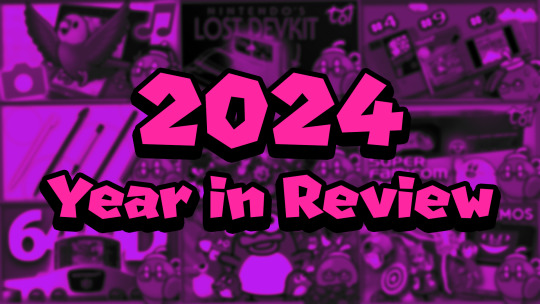
Wow! What a year. Compared to last year, a lot more things definitely happened, including several core videos I'm very proud of, the launch of Useless Nintendo Trivia videos, and the main channel finally passing the 50,000 subscriber mark! This has been one of the best years for the channel in a while, and I'm very thankful for all the support and feedback.
Outside the channel, my Bluesky account created in 2023 has passed 10k followers, I talked about WarioWare with Scott the Woz for an hour, and lots of very neat things happened in real life for me as well! I was able to switch day jobs in December and work with a company in the retro gaming space which is very exciting, and I visited America, met some of my friends there and attended the Portland Retro Gaming Expo for the very first time! So overall, a very eventful year, and I'm definitely excited to both look back on the stuff I've made, and give some hints about what's next!
You know the drill by now, I'm going to be sharing my retrospective thoughts as well as some fun facts about every video I've made on the main channel during 2024!
The Joy of Nintendo DSi/3DS Camera & Sound

This video idea was the winner of a Patreon poll back in June 2023...and yeah, ended up releasing in January 2024, but that meant it made for a pretty fantastic start to the new year! After talking about previous camera-related offerings from Nintendo like the Game Boy Camera and Photo Dojo, it only seemed natural to talk about the built-in camera and music apps for the DSi and 3DS, and I think it hit a great balance between being informative about the lesser-known aspects of these apps, and also having some decent gags! I even ended up upgrading my 3DS capture card from an old 2DS to a New 3DS XL during the production, just because I had to showcase the 3D mode-exclusive camera features. So far, it's served me incredibly well! I can absolutely vouch for the quality of Loopy's stuff now.
Some folks were wondering I managed to capture footage of the DSi camera and sound apps, the truth is...I kinda lied and that footage was captured on my New 3DS XL capture card! Yes, you can install and run DSi Camera and DSi Sound on a 3DS.
I'd like to once again give a shoutout to ThattsCherry (who also did the animation for my latest intro), who drew two animated shots featuring stylized Nintendo employees! Her style lent incredibly well to these sorts of visuals, though I did accidentally overlook a mistake where there was a 3DS logo in the background of a shot...about the DSi camera. (Oops) I also want to shout out TikaratheMew as well for the fantastic parakeet thumbnail art! (She also did the thumbnail art for my Famicom R.O.B. the Robot video as well!) I posted this sketch/final comparison on social media previously, but here it is again for posterity:
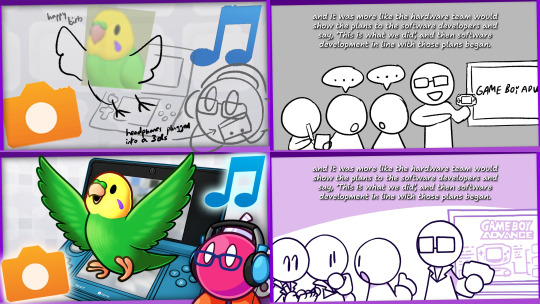
And finally, just a random fact: the brief gag featuring the 'retro-inspired indie game' actually comes from a university programming assignment I did years ago, but reskinned with generic pixel art as the original just used 8-bit sprites from Super Mario Bros.! (It also ran way faster than it was supposed to because it was originally programmed on a Windows virtual machine running on a Mac...so yeah.)
I Went to Hong Kong's Nintendo Live & Pop-Up Store
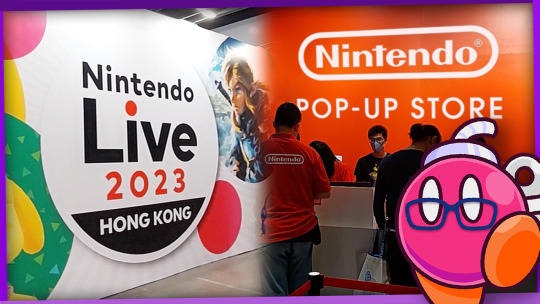
This video was a great opportunity to document two Nintendo events that were basically happening in Hong Kong back-to-back, and I hope it was useful for those who weren't able to attend these events, or those who want to know more about Nintendo's international events! I still hope these events are successful enough to warrant future large-scale Nintendo events in Hong Kong (which I am totally down to also document), but we haven't had further confirmations outside of a few series-specific promotional events now and then. Here's hoping!
Since this video, more Nintendo Pop-Up Stores have opened in places like Taipei, Seoul and Singapore, with the latest one being part of a manga convention in Barcelona! Seems like they've been doing pretty well, and makes me wonder if they'll ever revisit places for a second round!
Though aside from these pop-up stores, there are still plenty of officially authorized partner stores in Hong Kong that sell both Nintendo products and merch! A very neat one that opened recently was 'Assemble' in Wan Chai, which not only had Nintendo merch (including new stock for the Super Famicom Mini for some reason?), but had dedicated merch areas for third-party partners like Sega, Namco and Square Enix, and even had demo stations for indie games and Arcade Archives releases!
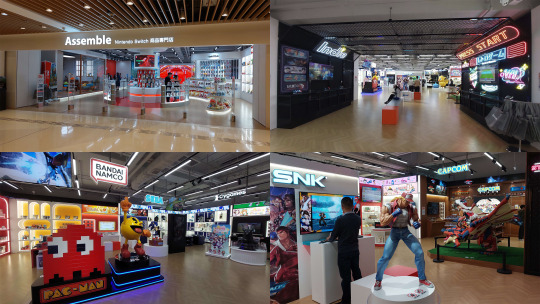
A Cartridge for Nintendo's Lost Devkit

In terms of obscure Nintendo stuff that has been talked about on this channel, the Game Processor RAM Casette is definitely way up there! While these carts (and the Game Processor in general) have been known to exist for a while, and this is also not even the first YouTube video about the Game Processor RAM Casette (Circuit Rewind was ahead of me and figured out how to reprogram one using a Raspberry Pi!), I'm still glad this video was able to get more eyeballs on this little known piece of Nintendo history, and perhaps the dream of finding the Game Processor isn't dead yet! (Hey, if the largest Sony CRT ever made could be found, anything's possible.)
One thing I actually didn't touch on in this video is the packaging that the Game Processor RAM Casettes originally came in! And with a few more auction listings popping up online since that video, I can now show you that...they're basically completely blank Super Famicom game boxes. That's kinda funny.
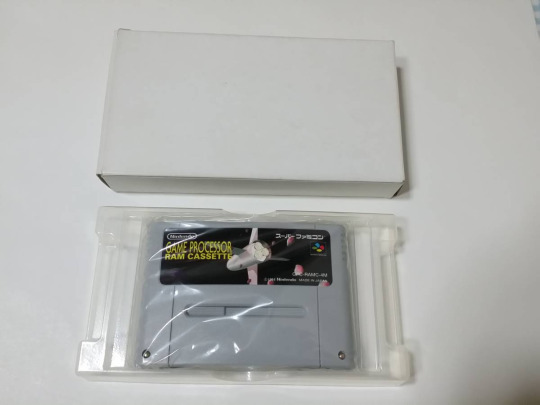
I mentioned that one of the assets for a Mario Bros.-style game created with the Game Processor's editing tool 'Mario Factory' was later reused for the Mario Bros. minigame in the Super Mario Advance series. While we do have an image proof of this from a flyer scan, I didn't show it in the actual video as the original Japanese accounts that posted these images seem to be a little strict regarding reposting of their work, and I'd like to respect their wishes if possible. With that said, I can now link to those original tweets here, if you haven't taken a look!


How Many Times Have I Paid For Super Mario Bros.?
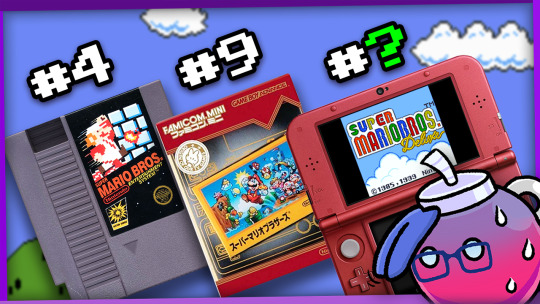
For Mario Day this year, I decided to just do a scripted video about a ridiculous Mario topic, and since I already had a spreadsheet lying around that kept track of every legal copy of Super Mario Bros. I own, this video was the result, and it ended up as silly as I envisioned it to be. Perhaps Mario Day videos can be another fun annual tradition, though I haven't thought of any ideas for this year's right now. (I mean, I could talk about all my copies of Mario 64 like I teased last time...but that's probably a better fit for the Plus channel!)
The obligatory question is, have I obtained any new copies of Super Mario Bros. since this video was published? The answer is yes: I obtained a loose cartridge of Super Mario Bros. + Duck Hunt + World Class Track Meet on the NES, Super Mario All-Stars + Super Mario World on the SNES, and a US copy of Super Mario All-Stars Limited Edition on the Wii! The count continues.
Those with keen ears may have noticed that the endslate theme in this video is an arrangement of the 'Every Day is a Mario Day' commercial jingle! I asked Megan, the composer of my endslate theme, to give it a little remix for the occasion, and it turned out so well, I definitely have to use it more than once now lol
Useless Nintendo Trivia #1-5

This year marked the start of the 'Useless Nintendo Trivia' series, each installment containing 10 useless Nintendo facts, inspired by my 2023 April Fools video. This was conceived as a relatively simple but fun series of videos that I can put out in-between the major productions, and so far we've covered 50 whole pieces of useless Nintendo trivia! I'm very happy about how this series has been received, so...yeah, more episodes will definitely be on the way! When we reach 100 pieces of trivia, it might be fun to do a compilation of them to see how long they would be when put together!
You might've also seen that some pieces of trivia have also been uploaded to the channel as YouTube shorts. I think this is basically the best way to utilize the shorts format going forward, rather than focusing on making exclusive stuff for it, and if one of the shorts does end up blowing up, it'll still be a nice bonus!
Every Nintendo Stylus

And here's 2024's April Fools video...which if I recall correctly, was another spontaneous idea! I originally talked about Nintendo styluses as an unscripted video on Akfamilyhome Plus, one of the first unscripted videos on that channel in fact, but that video actually left out a few styluses that I didn't have on hand at the time, so I figured if I were to revisit the topic, it would be in the form of a scripted video to cut down on the babbling, and possibly as part of the April Fools series (just because of how ridiculous the topic is). This video blowing up in views is something I can't exactly say I anticipated, but I guess joke topics just do that sometimes...
I made a joke in the video about if anyone ever used the original 3DS stylus by just extending it halfway, so allow me to showcase this incredible reply comment:

When I was looking for accurate stylus terminology for this video, I was made privy to a patent-related rabbit hole that eventually culminated into a piece of useless Nintendo trivia! I'll just link you to the short version here if you haven't seen it yet.
The 34 Games I Beat in 2023
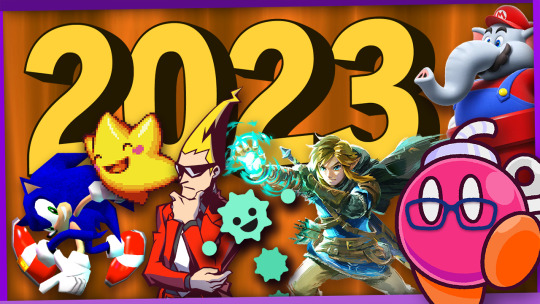
The 2023 game review video ended up coming out in late April because of the Mario Day and April Fools videos (...which may end up being the same case for this year if I can't get it out by February, oops), but this time around it did perform a little better than my 2022 video! It's still neat to have a time capsule of sorts about my immediate thoughts about each game I've finished, and the unpredictable lineup still makes it a fun watch for some. Just to look ahead, 2024's game lineup will be a little shorter at 25 games, but there will be a bonus section or two here and there!
Not much else to add here for this video, but if you look in the description, I have a link to a spreadsheet that compiles an alphabetical list of every game I've looked at in this series of videos, for those who want to look up my quick thoughts about a particular game!
Nintendo's Hotel SNES: The Super Famicom Box

It seems like pretty much every Things of Interest episode released in 2024 was a result of spontaneous new finds and additions to my collection, and the Super Famicom Box was certainly no exception. There have been several YouTube videos that show off the system before, but there haven't been as many scripted videos that also dive into its deeper functionality, so that's sort of what the aim of my video was, to showcase how it would be to set the whole thing up and go through its many settings for the folks (a.k.a. most people) who don't have one, and also offer a simple point of reference for those who do end up getting their hands on one. Really, the only thing I haven't done in the video is basically take the system apart -- there are people out there who are way more qualified to do that!
I've shared the following links in one of my monthly Patreon reports, but for those who haven't seen them, here's a few more interesting videos related to the Super Famicom Box that are worth checking out:
Long Island Retro Gaming has done a mod adding RGB to the system -- and with some results you may not have expected!
Some of their footage was used in my video, but Impendo64 has both added a custom coin slot to their unit, but has also apparently modified one of the game cartridges to add custom games onto it! I hope they make another video showing how they did it in the future!
This is about the original FamicomBox and not the SFC variant, but Yukki games came across a few working FamicomBoxes still doing their jobs in a small Japanese hot spring inn, if you'd like to take in the vibes!
64DD on a Flashcart: The SummerCart64

The Things of Interest video about the SummerCart64 is one of the few unscripted videos on the main channel, where I basically take a look at a thing by just...casually using it and showing off its features! That felt like the best format to show off this flashcart in particular, especially because 64DD support was the one interesting part about it. I did get the price of the Phenom Mod version of the cart a little wrong in the video (I misquoted the PCB price instead of the fully assembled one with shells), but in the end it was still neat to get some more eyeballs on this project, and a few new developments have been made since that video as well!
Since the video, the N64 Flashcart Menu has seen several updates that addressed some of my previous (minor) complaints: there's now a functional settings menu within the interface, and most recently a favorites and history tab have been implemented!
And since Phenom Mod released their version of the SummerCart64 for order, plenty of other cheaper SC64 clones have also started to pop up on the market, particularly ones on Chinese sites like AliExpress. I even got a free product offer from one of the sellers! (but decided against it as it would make for a pretty redundant video) While I can't compare every variety of the SummerCart64 out there, I was eventually able to get my hands on two different AliExpress variants of the SummerCart64. They had pretty different molded shells (one being a tighter fit than the other) and cart connectors, and while in terms of functionality they were fairly similar, making it a viable option for those on a limited budget, they definitely don't have the luxury of the Phenom Mod's more durable build, along with proper support available in the N64brew Discord should any problems arise, so I think there's still some worth in that! This is just my opinion though, it's up to you to decide which SC64 variant you want to go for for your own purposes.
I Broke the Nintendo World Championships Leaderboards
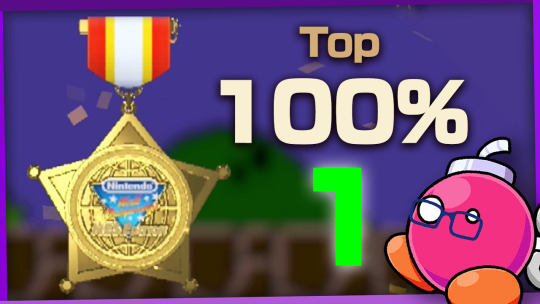
Speaking of spontaneous video ideas, this video definitely was one, being basically born from a stupid Discord conversation while playing the new Nintendo World Championships game. The resulting video is definitely a rare breed for the channel, it's been a hot while since I've done a 'what happens if you do x in y' type of experiment for a video, but it seems people did end up enjoying it!
The week this video went live, I actually tried the same strategy to get on the 2024 Birth Ranking again, and it seems that no one else ended up trying it out for themselves! ...which makes sense, because the setup is way too convoluted. But if there's someone out there still determined to try this trick right now, there's a high chance you'll be able to earn 1st place on the 2024 birth year ranking for yourself! (Or rather, 2025 ranking now lol)
Pyoro: The Bird, The Beans, The Legend
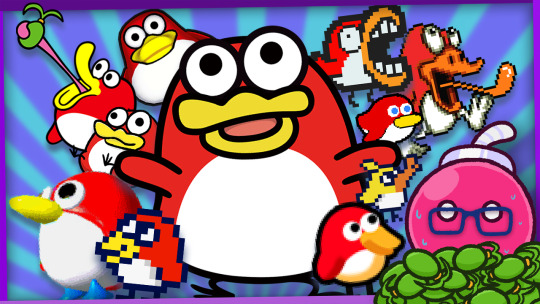
...and finally, this was the next big core video that I was originally intending to make, following the 3DS/DSi Camera & Sound video! As I said in the video itself, this idea came long before the leaker known as Pyoro became a prominent figure, and with the release of WarioWare: Move It, it made for the perfect opportunity to do a Pyoro retrospective with some fun gags sprinkled throughout. And in a first for the channel, this is also the first ever sponsored video on the channel! ...I'll talk about more of my thoughts on that down below in a bit.
If you look at the video thumbnail, all of the Pyoros featured come from a piece of official artwork or in-game sprite...except one, which I drew back in 2021.
Turns out, there were several Pyoro cameos that I forgot to mention: for some reason my mind completely blocked out the fact that Super Pyoro appears in the intro of WarioWare Gold, and there's also a small blink-and-you'll-miss-it Pyoro cameo in WarioWare Move It:
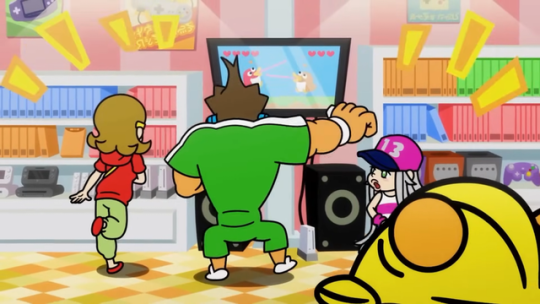
As I said, this is the first video on the channel to be sponsored (by Surfshark)! As taking a sponsor was something I'd never done before, I felt this was a good learning opportunity to do so, and considering how well the video ended up doing, I think Surfshark probably got way more than their money's worth in the end...
Before I ever considered legitimately taking up a sponsor offer, I set several rules for myself: anything I promote must be something I've used in the past and can recommend based on personal experience (if it's something I've never heard of then I would at least do my research and give it a try first), and the sponsor integrations should be made as fun as possible. The Pyoro video was essentially a testing ground for these principles, the idea of integrating the sponsor led to the creation of the VRChat skits, and as a result I think it turned out pretty well! (A post about the sponsor segment itself ending up doing numbers on Twitter, which I think is a good enough indicator lol)
The reason why I took this long to accept any sponsor at all is simply because a lot of offers that come through to my business inbox don't always look the most legit at first glance, especially if it's from a product I've never heard of before. I've also never went through the process of taking a sponsorship myself, and I've heard a few stories of bad sponsors or phishing scams involving fake sponsorships, so I was basically extremely vigilant about them. That being said, this sponsorship was definitely a net positive for me as a learning experience! I don't know if I'll end up taking more sponsors in the future, as it really just depends on the right one stumbling into my inbox that I think I can actually execute properly. And between my inconsistent video schedule and my recent job switch, I don't think I'll have to deliberately seek out sponsors in the near future. I'm feeling content with having this YouTube thing as a side hustle for now, with Patreon support and perhaps the occasional sponsor as bonuses that will potentially push me slowly towards being able to do this full-time in the far future!
And lastly, if you didn't know, some outtakes and animatics for the VRChat skit segments in this video are available to my $5+ patrons!
Nintendo 3DS E3 2010 Demo Showcase

And in time for the new year, another spontaneous video! I originally planned for a Things of Interest episode to release around Christmas or before the end of the year, but while I was working on it, I was contacted by a team working on preserving some 3DS tech demos from a prototype unit in order to make a video documenting them like I did with 3D Challenge back in 2020, and of course I had to say yes!
It was very fun to both help out with research as these demos were being studied, and to write the script for the showcase as well! I think this is one of the best ways to handle a release of this sort: not just hacking the demos so they can be as playable as possible for the public, but also documenting them in a video so detailed info about them is also as easily accessible!
Yes, the ending is a tease for something else 3DS-related to come. Don't know when exactly that will be as research is still being done to put it vaguely, but it's something I personally think is almost as cool!
Akfamilyhome Plus videos

If there's only one thing I regret for this year, it's the smaller amount of content being put out on my second channel Akfamilyhome Plus, because ironically I got busy from all the videos being put on the main channel instead! Still, there are a handful of bonus videos that have been released publicly on there this year:
I gave Alivel Mall from Kirby and the Forgotten Land lyrics for the game's 2nd anniversary
I tried a Gyromite-themed mini board game on a Japanese pencil case from 1985
I talked about how I create YouTube captions from my scripts
I tried the Nintendo Ten Billion Barrel for the first time
...and as mentioned in the beginning, I documented my very first trip to America!
And over on Patreon, 4 exclusive videos were released: I took a look at some third-party Joy-Con, played PC games with an actual Game Boy as a controller, did my annual room tour for 2024 and built a Famicom made out of cardboard!
Alright, what's next
Okay, so as I just mentioned, I was working on a Things of Interest episode right as I was approached to make the 3DS E3 2010 demo showcase, so right now work will be resuming on that video! And seeing as you've read this far into the post, as a thank you I'll let you in on what it's about...

...it's an original, working Nintendo Ultra Machine from 1967! Just like the Super Famicom Box, while there are videos online that showcase it, there's not a lot of scripted videos that get into the history or nitty gritty details, so I'd like to take this opportunity to showcase one of Gunpei Yokoi's earliest inventions!
In addition to that, there is another Things of Interest subject that I'd like to talk about, Useless Nintendo Trivia will obviously continue with new sporadic episodes, and the next major core video topic has already been decided, though with all these projects in the pipeline, it might be a little bit before that's fully in production!
Overall, I'd like to keep up the momentum this channel picked up in 2024. I was pretty close to my goal of having a video out on the channel every month, save for edge cases where I released a video right as a month ended, or September onwards when I was occupied with my trip to America (and documenting that into a video) among other things! While I have switched jobs in real life, I'm currently hoping it won't affect too much of my video schedule going forward, as working on this channel is something I continue to enjoy immensely, and I'd like to thank you all again for watching in 2024.
So yeah, that's it for this long year in review! Once again, as a thank you for watching all the way to the end, here's a 25-use invite link to my Discord server where chill gaming talk happens! I'll let you in on a secret: these links actually aren't clicked on a whole lot if last year's post was any indication, so if you're reading this, chances are it's still available lol
That will be it for now! Here's to another great year for the channel, and I'll see you in the next video!
16 notes
·
View notes
Text
Ch 61: Interest
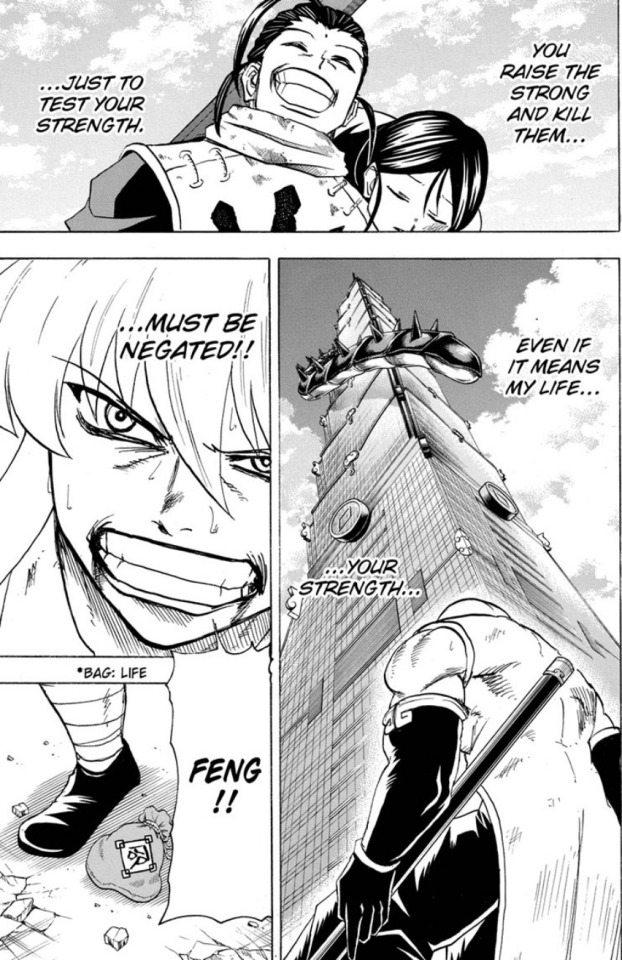
Shen's desperate to bring down Feng even if he has to sacrifice himself to do it. Since Feng only responds to strength (and certainly not logic!) there's only one way to keep him in check!
And what's up with that bag at Shen's feet? Are those senzu beans? Shen is going to need a powerup if he's gonna defeat Feng!
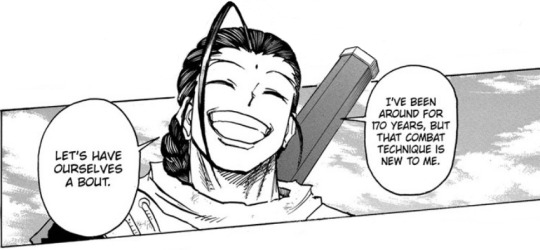

Feng doesn't have a scratch on him after Andy's attack! He's gonna be trouble for our team of fighters. They'll either have to collaborate to chip away at him and wear him down or take him out in one catastrophic attack, because fighting him in a traditional sense is going to be a mistake.
Before I get too far into the chapter, I want to look at what I *believe* are *some* of the influences for the character of Feng. I certainly don't know Tozuka's mind, and I'm not trying to say that these are 100% intentional, but these are some other characters who remind me of Feng in interesting ways.
1. Tao Pai Pai
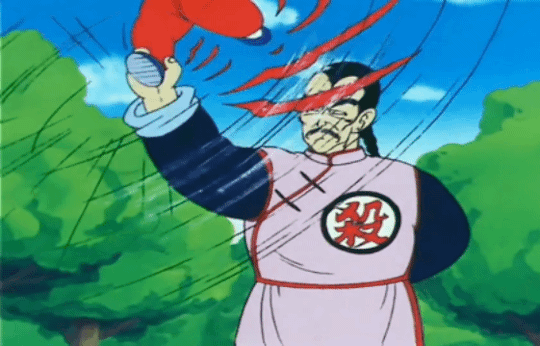
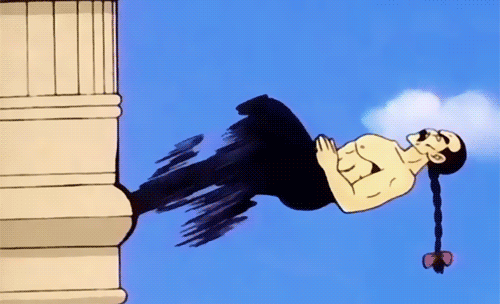
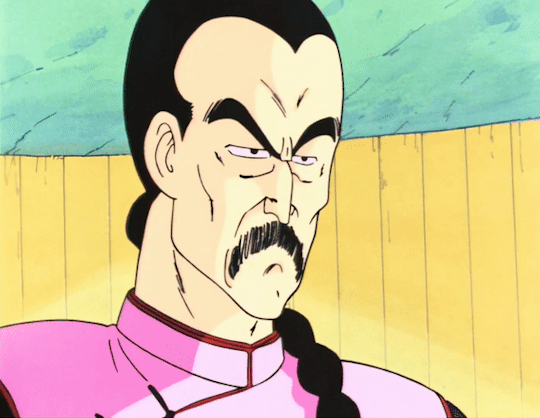
Tao Pai Pai (Mercenary Tao) debuted in Dragon Ball chapter 85 as a notorious assassin hired by the Red Ribbon Army to take out Goku. He's ruthless, greedy, arrogant, selfish, uses his braid as a weapon, and even kills someone with his tongue. He's also 291 years old, despite his middle-aged appearance. I don't think there's ever an explanation for how he lived so long. He's just a sage that way, I guess.
There's an anime filler scene where Tao Pai Pai even gets a black cloud like Feng's, though it doesn't last very long.
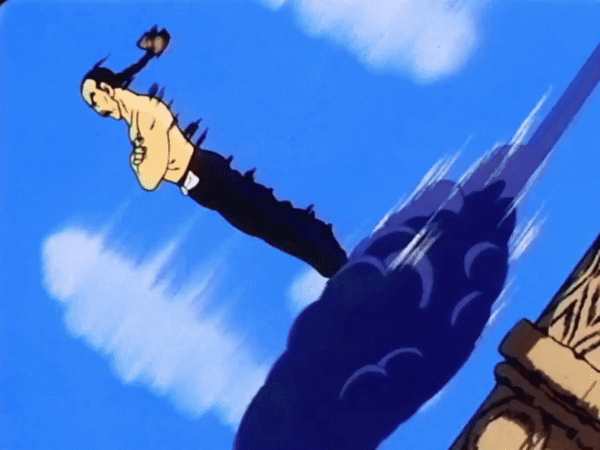
Tao Pai Pai was visually based on the villain from the Jackie Chan kung-fu movie Snake in the Eagle's Shadow. Take off the mustache, and you'd have someone who looks a bit like Feng (though Feng smiles a lot more than this guy).
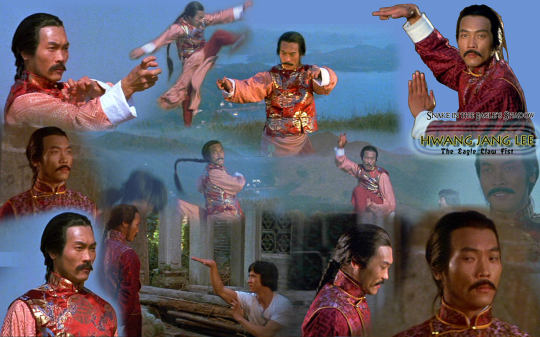
But in the end, Tao Pai Pai proves to be a coward and doesn't have anywhere close to the grit, determination, and near-invincibility of Feng. He fights dirty, pretends to surrender, and generally acts like an arrogant dingus. Our Feng would run circles around this scrub. Still, there are parallels between them that I'll point out during his scenes.
2. Feng from The Iceman Cometh
The Iceman Cometh is a 1989 Hong Kong film that's kind of an isekai of its day. It has a villain named Feng who uses a time-travel device. The hero and the villain travel through time to 1989 Kowloon, where the bulk of the film takes place. Spoiler: Kowloon is Feng's last name in UU.
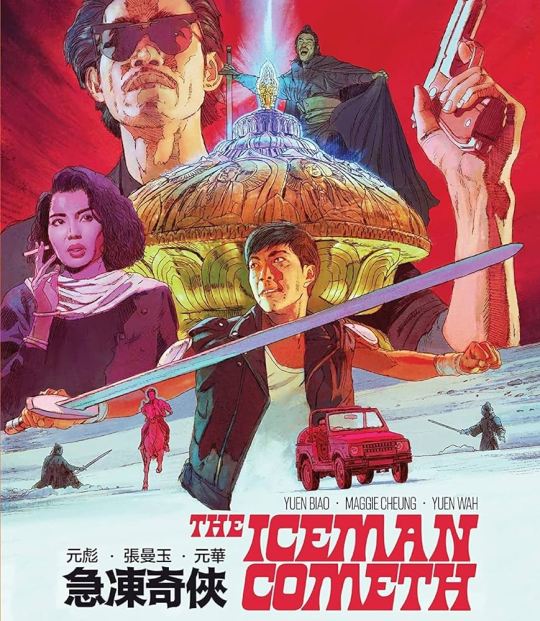
Though both the Feng in the movie and our Feng are excellent fighters, hate-sink villains and snarkers, the "Iceman" Feng is a much, MUCH, more evil character than the UU Feng, and that's saying a lot. You can see how bad he is because of his evil mustache.
3. Feng Wei from Tekken
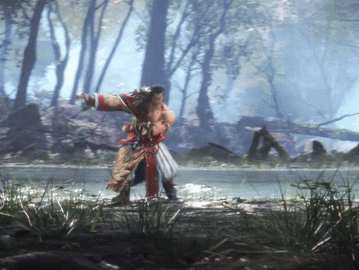
I haven't played a fighting game in...decades, but I hear that Feng Wei is a hot-tempered Blood Knight who's obsessed with becoming the greatest fighter in the world. He fights in a different style than Feng's Bajiquan, though. As much as Tozuka loves referencing fighting games, I wouldn't be surprised if Feng Wei was an influence.
Honorable mentions:
Akuma/Gouki from Street Fighter, who's obsessed with fighting Ryu at his peak
Younger Toguro from YYH, who would go to great lengths to preserve his strength and youth
Anyway, the character of Feng is heavily based in the Arrogant Kung-Fu Guy who's always looking for a Worthy Opponent, and if he can't find one, he'll create one. He's neglected almost every other aspect of life in pursuit of power and satisfaction, and it seems he'll never be satisfied until he's killed by someone he deems worthy.
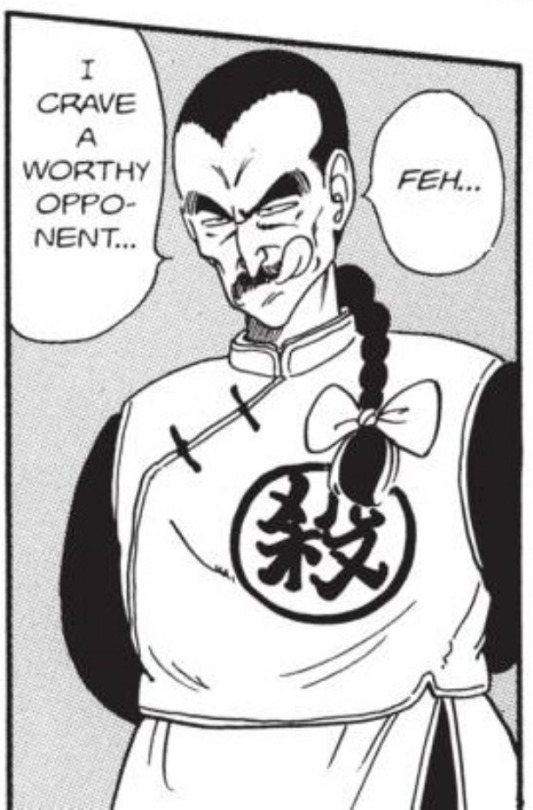
Shen and Feng are two different sides to the same coin-- a life dedicated to martial arts can take a dark or light path depending on the motivations of the user, which is a common theme in works about martial arts.
OK, with all that out of the way, let's continue the chapter!
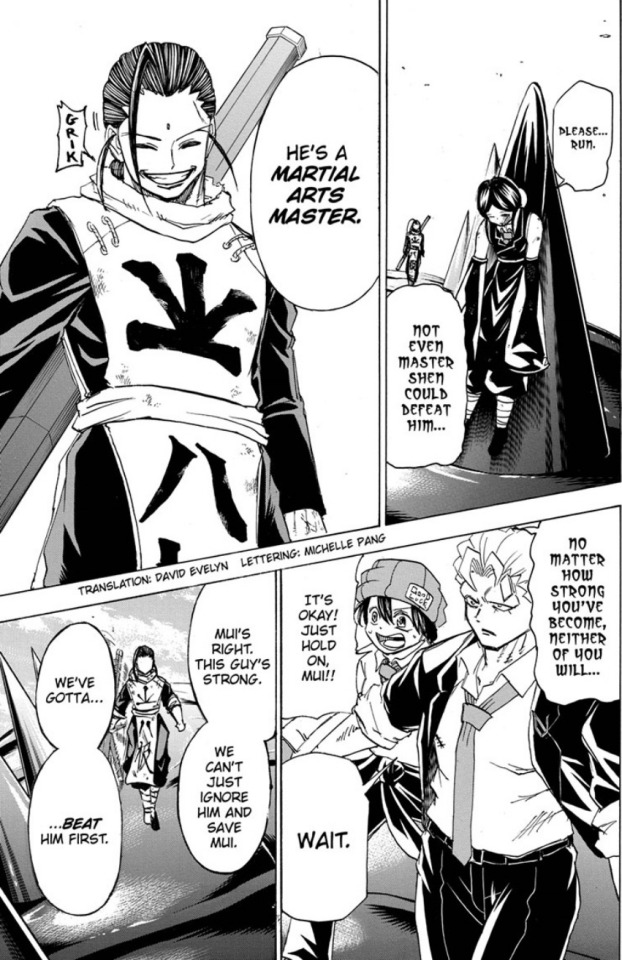
Yeah, you can't just introduce a character like Feng and then not have Andy fight him! Slow down, Fuuko! We've gotta see Feng slug it out with Andy!
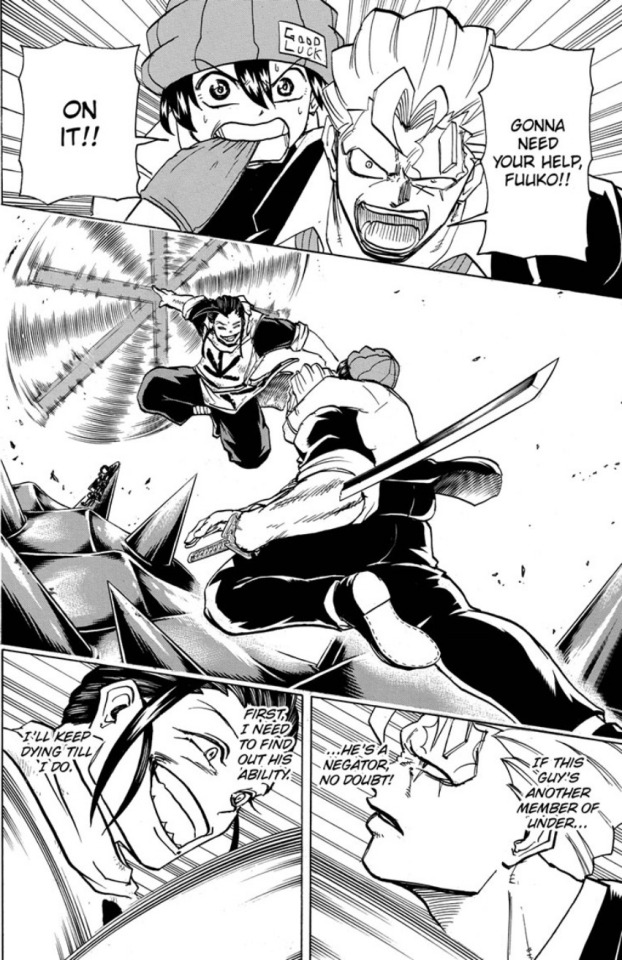
Well, that's certainly a strategy!
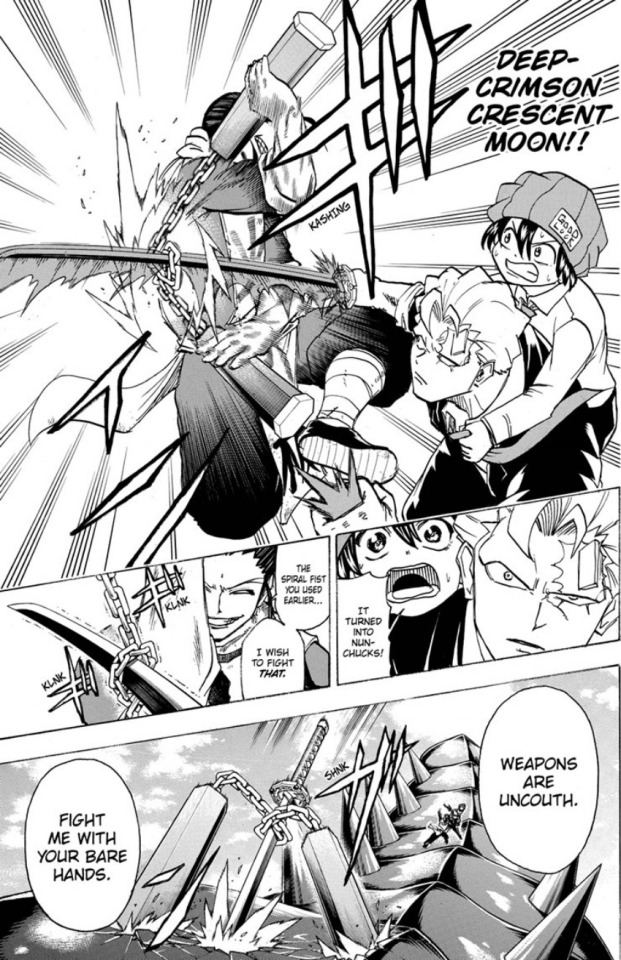
Feng's staff can transform into nunchucks to adapt to different kinds of fighting situations, just like a good martial artist. It's a versatile weapon that's well-suited to a quick-thinking fighter like Feng.
Being adaptable and able to shift styles and weapons is a major theme in a lot of Bruce Lee flicks, so it's no surprise to see Feng strike Lee's famous taunting pose on the next page.
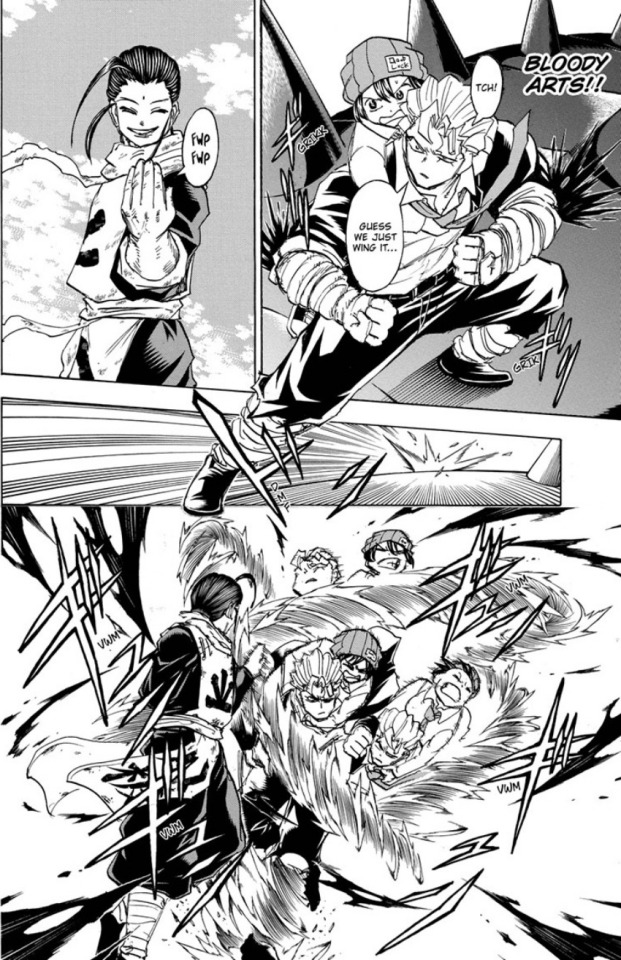
Andy accepts the invitation so quickly that he steps out of his panel! He attacks with supercharged punches while Fuuko holds on for dear life! But Feng is still just standing there barely moving...
Despite the frenzy of his attack, Andy's thinking strategically about how to bring Feng down. He's not interested in prolonging the battle the way Feng is.
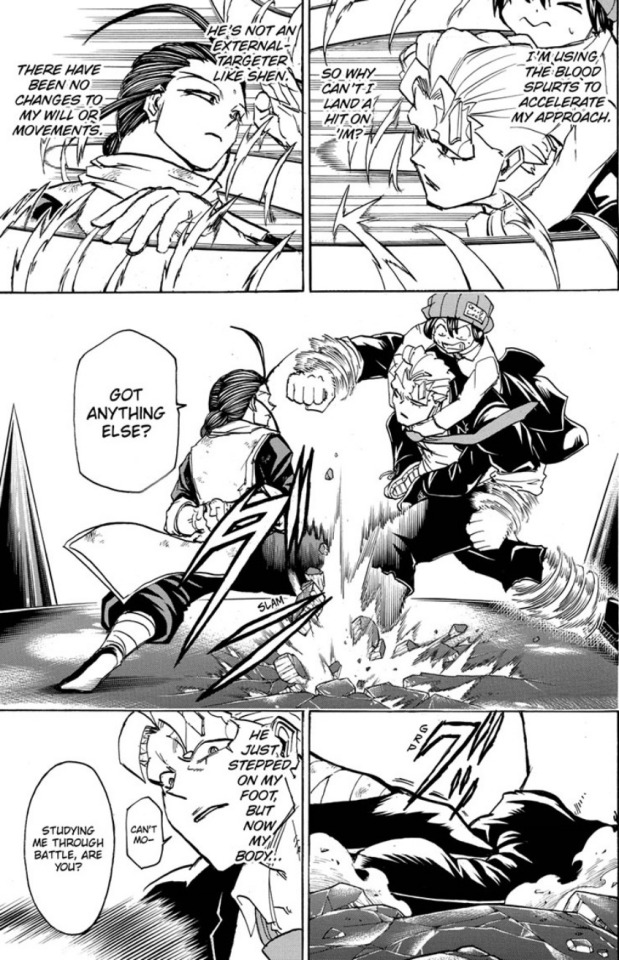
Feng fights with his hands behind his back the way Tao Pai Pai does.
His foot stomp is so powerful that it cracks the UMA's body, like the Earthquake Foot in Kengan Ashura or this scene from Kung Fu Hustle:
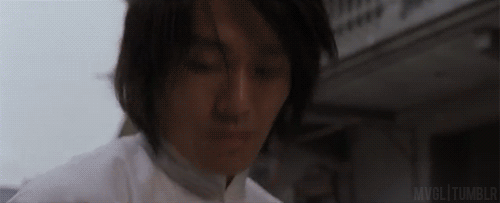
Andy is incapacitated by it, too! Shen is way too powerful!
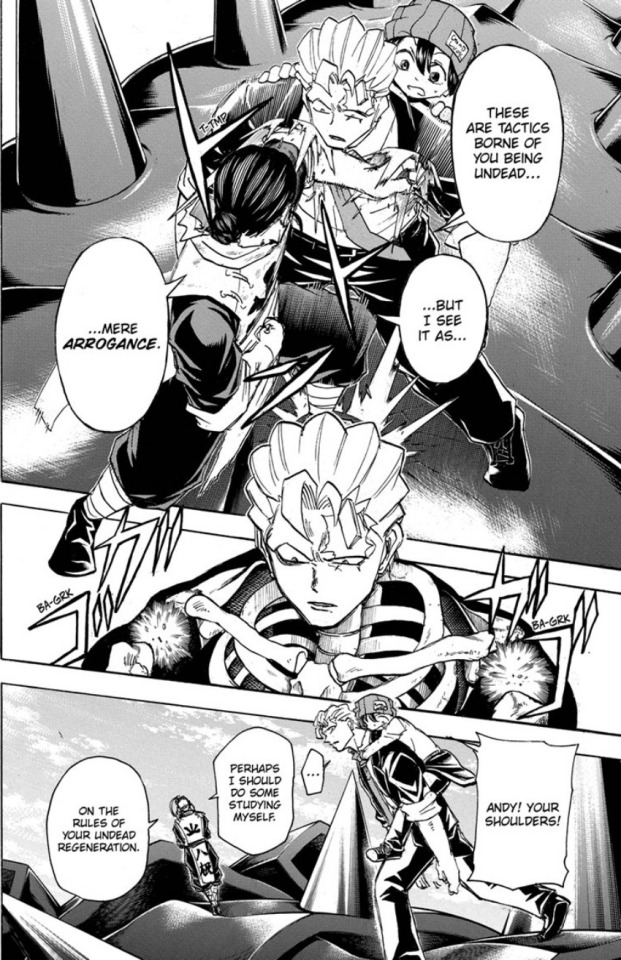
Pretty rich for Feng to be calling someone else arrogant!
Ouch! Poor Andy! Using his wrist and elbow, Feng dislocates both of Andy's shoulders at once.
Feng's figured out Andy's rules before Andy had a chance to test Feng. Andy's strategy was to "keep dying" until he discovered the rules, but if Feng is only going to incapacitate him, then Andy won't be fighting at his full strength.
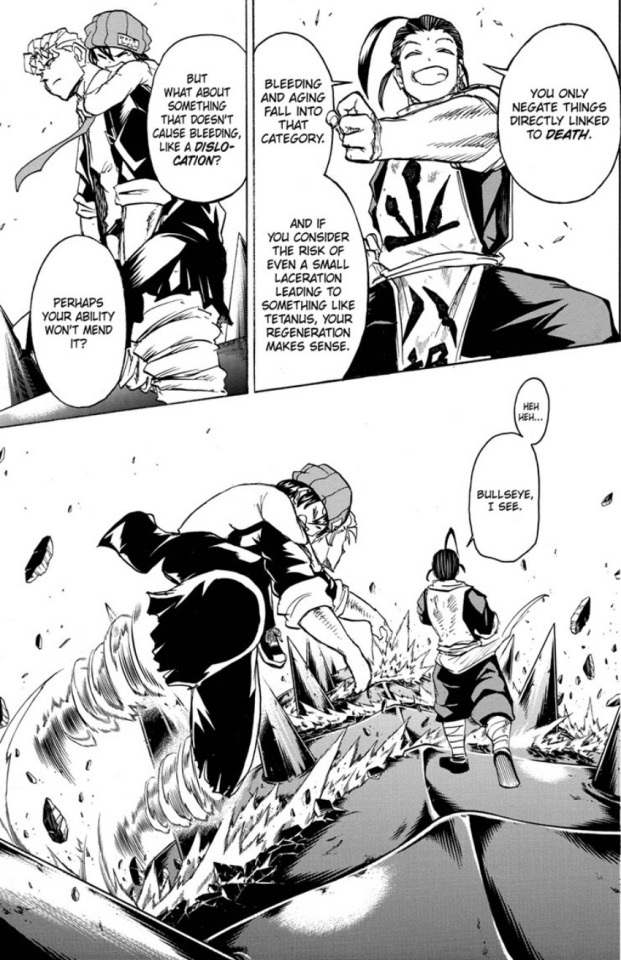
But but but it could cause osteoarthritis? Or ligament damage? And that could be deadly because... bone spurs? IDK, I'm grasping at straws here. I don't WANT Andy's power to have a loophole! But I suppose if someone has to discover a loophole, it should be Feng. I wonder if Juiz knows about this detail...
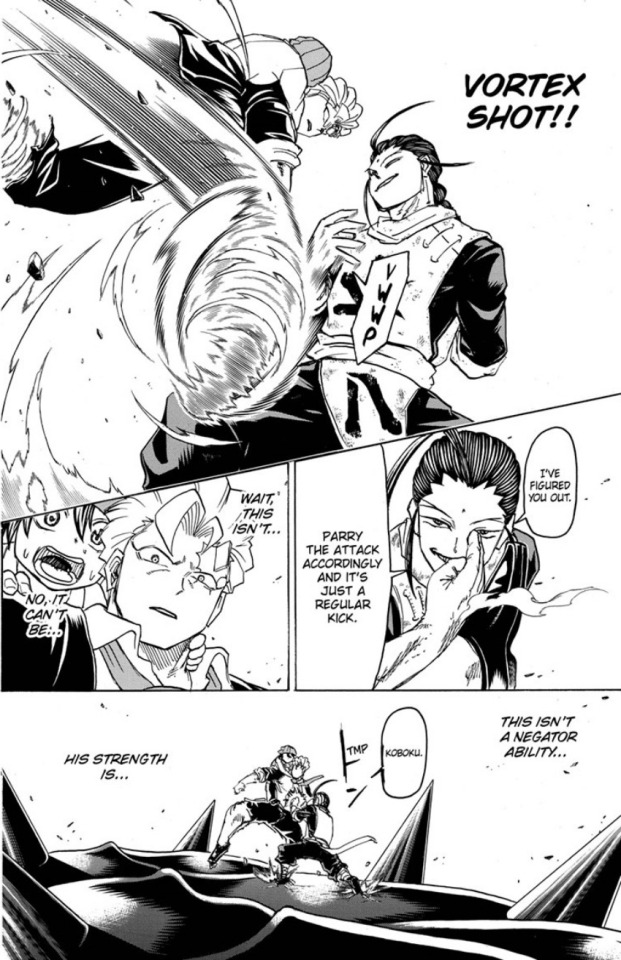
Andy attacks again, but Feng blocks with his forearm. Why can't Andy damage him???
Feng attacks with a double-palm strike:
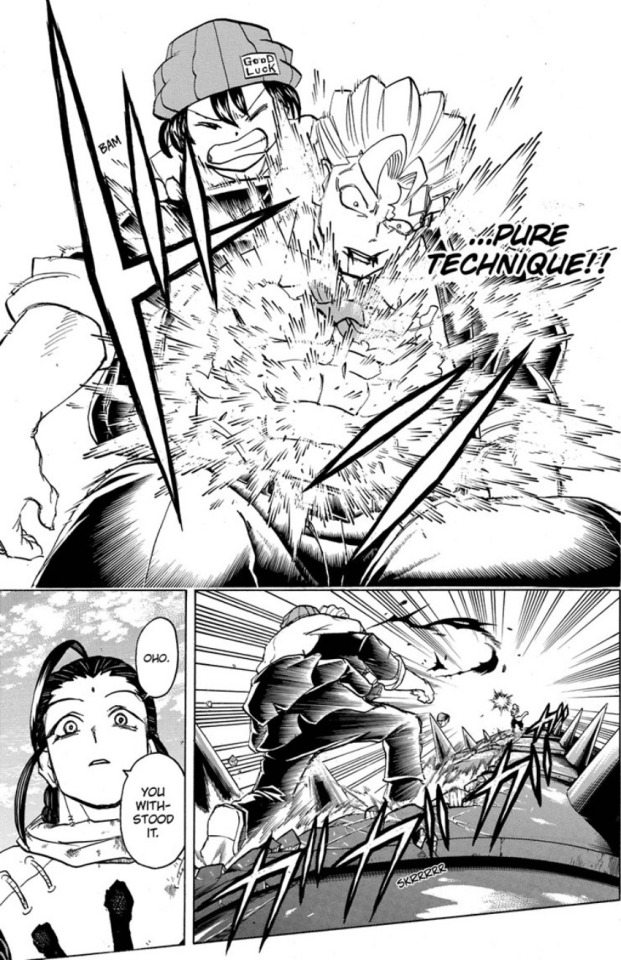
Oh damn, Feng isn't depending on an ability! Everything we've seen has just been his natural fighting power! He looks genuinely surprised that Andy's still standing. Perhaps Andy is a worthy opponent?
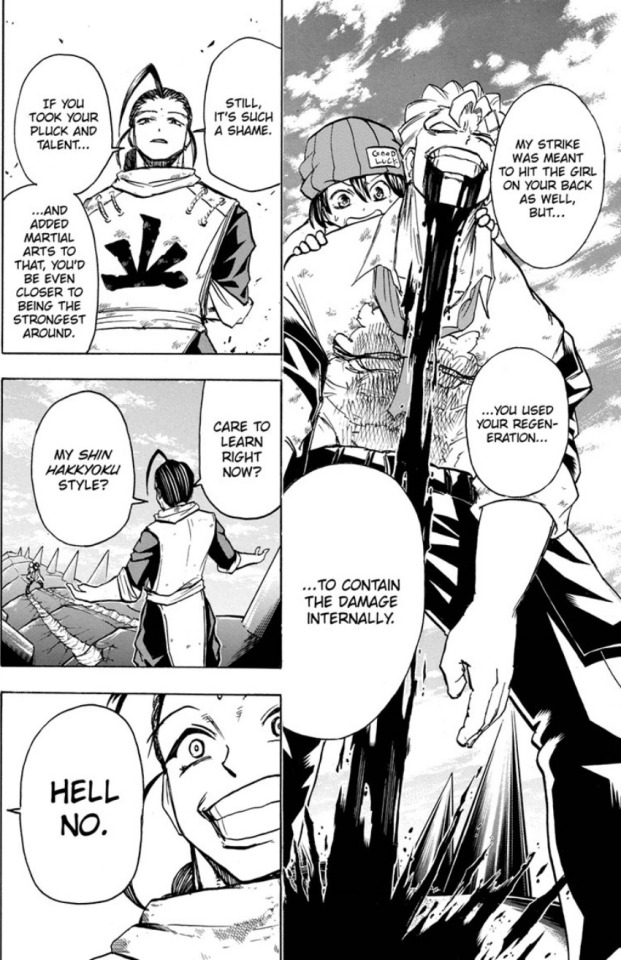
Finally, we learn the name of Feng's style! By the way, if you're wondering about the Japanese names of Feng's moves, the UU English translator David Evelyn explained them here!
I would also like to mention Andy's sad shoulders. Utterly heartbreaking. I don't think we've ever seen him slouch like that before! He really looks incapacitated that way, and from Fuuko's expression, it's concerning her, too!
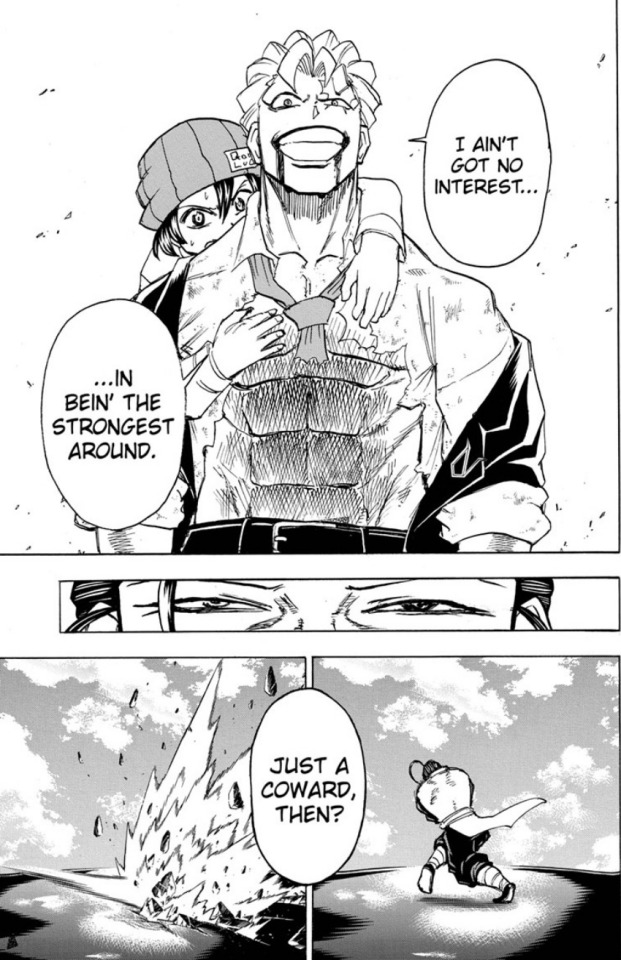
This page, though! I love this simple layout and how much it shows about the battle. Feng's lost his smile, but Andy's grinning now!
Andy's disinterest in being the strongest is curious. If he DID have that ambition, I'd imagine we'd see a lot more conflict between him and Victor. To Feng though, anyone who lacks that ambition is a coward.
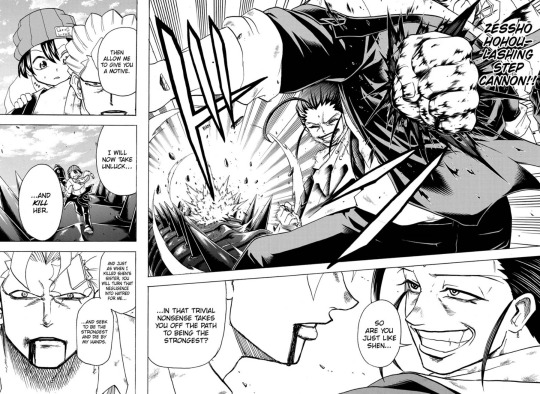
Feng punches clean through Andy, likely attempting to take out Fuuko since he knows Andy can heal from something that catastrophic.
Feng taunts Andy for caring about something more than just his own strength and threatens to kill Fuuko in order to make Andy power up. Jeeze, this guy really has only one strategy to motivate people...
WHAT IF I KILL YOUR LOVED ONES?!? THEN WILL YOU BE STRONG?! THEN WILL I BE STRONGER THAN STRONG YOU?!
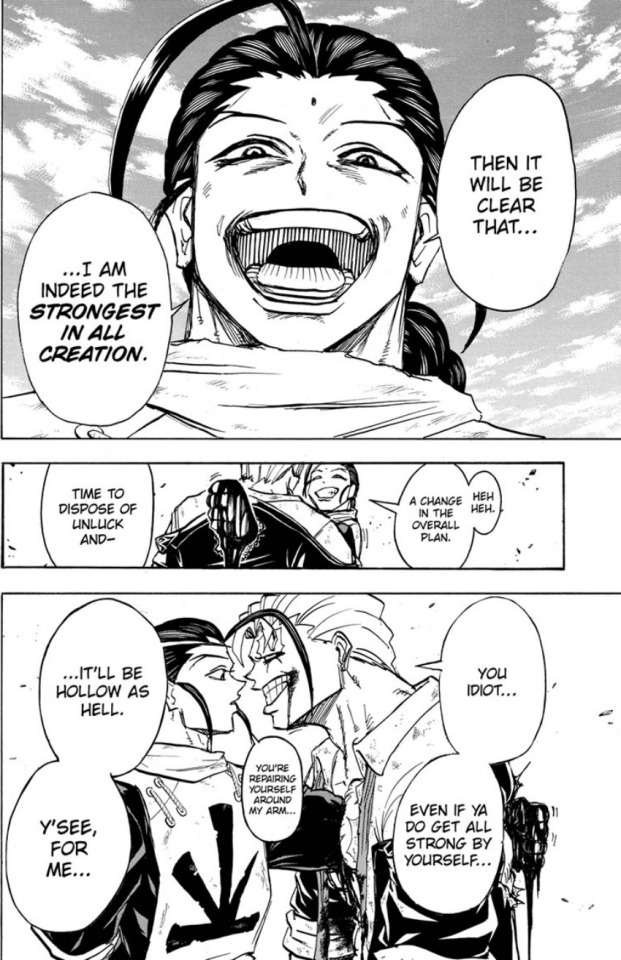
Best zombie.
"While I've got you here, let me tell you something..."
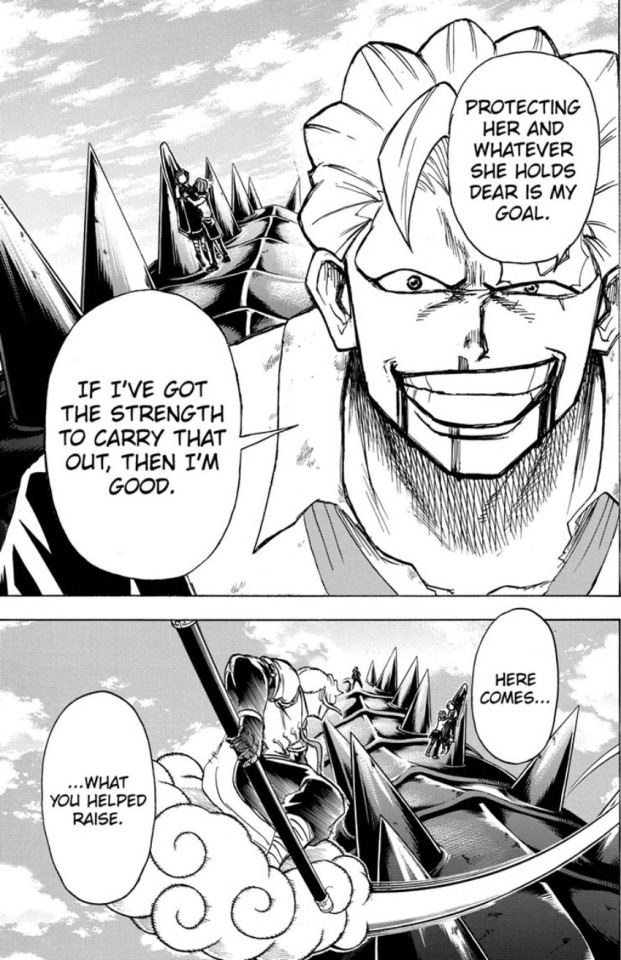
Feng, of course, has ignored the advantages of working in a team and fighting altruistically.
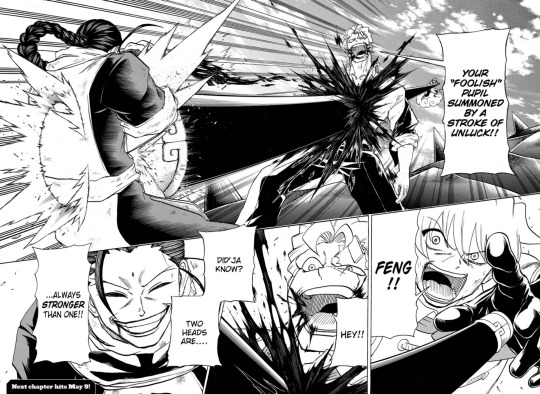
Shen's been missing for a minute! He comes back in style to stab Feng through Andy, much to Andy's surprise. Feng is delighted to see that Shen's emotion-powered attack was so strong! He's willing to do anything to fuel their rage. Can the Union work together to beat him without losing their cool?
Masterpost
#undead unluck#overreading undead unluck#been wanting to write this one for a while now!#almost hit the image limit
20 notes
·
View notes
Note
what video games would you recommend for someone who literally has never played any but has always wanted to get into them, with a good story line lol
HMMM ok… ok. ok. these are mostly RPGs because i think people tend to recommend “cozy” games to beginners but for me its all about story.
Red Dead Redemption 2: aim assist mechanic, no constant danger, good story, dress up element, character arcs that make sense and make you feel so much
Dragon Age Inquisition: good story, character and background customization, do a lot or do a little (lots of side quests but not necessary), good npcs, romance (i love all the dragon age games but this one is most beginner friendly)
Mass Effect: a queer leader in rpgs! interesting sci fi story, simple mechanics that span across all the games, do a lot or do a little, character customization, good npcs, choices matter
Night in the Woods: almost a visual novel, story and character driven, beautiful art,
Fire Emblem (3 houses or awakening): nintendo only sorry, simple game mechanic (basically checkers/chess), great npcs, lots of player choice, romance, choices matter, cool world
My Time at Sandrock: the only cozy game i’d put on this list, goofy, good story, do a little do a lot
Sleeping Dogs: simple controls, huge variety of quests and gameplay (racing, combat, stealth, fetch, chaperoning, etc) not overly long, well researched (its a great time capsule for 2008 hong kong!) slightly dated atp
if you have a suggestion go ahead! i picked all of these as games that i know you wont struggle with. my biggest advice is DONT PANIC. when you are learning a game and its controls, you will did! learn to save often and dont fret if u fuck up. also if ur stressed look at a walkthru
enjoy anon!!
17 notes
·
View notes
Text
deSPIRIA's staff interview
Interview given by the creators of deSPIRIA, published by the Dreamcast magazine in 2000-06-09. The interview is located at pages 44 and 45 in this pdf.
Many thanks for the person who archived this issue! You can see other deSPIRIA articles in here, but this is the only entry that has an interview, the other JPN ones are game guides.
Translation done by rio 🧬🦠🧬
Title in page 42: STAFF INTERVIEW The up-and-coming
Text on the first photo: How was 「deSPIRIA」 unique system and setting made? We will now chat with the staff of Dennou Eizou Seisakusho and a producer from Atlus to better understand the development of this piece of work.
Text under the second photo: Dennou Eizou Seisakusho, a company based in Osaka, situated right next to Higashiyodogawa. It has approximately 20 staff members, the game 「deSPIRIA」 has been developed in a garage modded into a production room. The scenery in this room is very different when compared to most game companies.
Profiles:
行澤星人 ・ Seito YUKUZAWA
Dennou Eizou Seisakusho (limited). Managing director
President and CEO of Dennou Eizou Seisakusho and deSpiria's art director. His most prevalent work is the PS game 「Dark messiah」 [Hellnight] (published by Atlus).
[Please get lost in the peculiar setting os this game]
藤本裕 ・ Yutaka FUJIMOTO
Dennou Eizou Seisakusho (limited). Planner
DeSPIRIA's director. He was responsible for the script, setting and such. His body of work includes RPG computer games and 「Dark messiah」 [Hellnight].
[Please have fun in this peculiar cybernetic world]
上田清隆 ・ Kiyotaka UEDA
Dennou Eizou Seisakusho (limited). Planner
DeSPIRIA's director. He has been involved in works such as 「Last bible」and 「ぐるぐるガラクターズ」(published by Atlus).
[Please pay attention to this dark script]
田中裕之 ・ Hiroyuki TANAKA
Atlus (incorporated). Producer
DeSPIRIA's producer. His body of works include 「Princess crown」 and 「Growlanser」.
[Please get absolutely hooked on this game's world]
- I want to know how did Dennou Eizou Seisakusho and Atlus get involved with each other.
Tanaka We have been associated with them since the release of the PS title 「Dark messiah」. Yukuzawa went to study CG in america, we started talking to each other about how I knew that there are people like this out there but how I had never met any one them. We talked a lot and as a result I got interested in this company Dennou Eizou Seisakusho that Yukuzawa and company created and asked them to proceed with the development of 「Dark messiah」.
- What is the reason for the company to be established in Osaka?
Yukuzawa Three years ago when we made 「Dark messiah」 and whatever location was fine for us really, but I was born and raised in Osaka and by pure coincidence the garage of a company building happened to be vacant. We didn't have any money we could borrow for the company, "so let's set it here" and that was it.
-What occasion caused the creation of deSPIRIA?
Yuzuzawa When we finished working on 「Dark messiah」 and we started talking about what we should make next, and made 「Dark messiah」 is also like this but, our scenario planner Fujimoto said he wanted to create a setting with an even stronger appeal and that is what kickstarted this project.
Ueda And then while thinking about the components in this dark world, we were shaping to this idea of making it a traditional RPG but then we thought "what if we make a system where we are able to read the opponent's true feeling without speaking to them" and then we fleshed it out.
Fujimoto 「Dark messiah」 is a horror adventure game set in Tokyo, but this time we wanted to produce a chaotic city based in Osaka, Hong Kong and such other places. But at that time we didn't plan for it to be a dark work. But then we incorporated the idea that Ueda mentioned and it resulted in a darkly cool Osakan setting that you can see in its visuals, script and such.
-Is there any building that was used as reference?
Ueda While talking with Fujimoto about creating a fictitious city based in Osaka, we talked about things like Naniwa and joked around about a tsūtenkaku robot, takoyaki missiles and making a game with an image like that, but we wanted to try creating a more serious game. We wanted to make a motif with a significance similar to the image of 「Black rain」 but not overly so. This is Fujimoto's own unique setting.
-What does this reinstated Osaka look like?
Yukuzawa Setting wise rather than a parallel world, it is like a possible future. It has the feel of a place that has the remains of the once destroyed city, but also has things that are completely different. It has areas that feel incredibly realistic with a setting that is completely different. It has many things that will make a resident of Osaka go "Ah, it is that thing".
-What is the theme of this piece of work?
Fujimoto The theme is "dread". This expression also means fear, but it is a type of fear that originates from internalized feelings, like desolation. Many other horror games have things like monsters and other things that are scary to look at, but we wanted to express through the dialogue a type of internalized fear that stems from the ambience and such.
-To express such a theme, the team also had to represent things that are taboo in the game industry though
Tanaka We worked on the game while being conscious of those restrictions, but once the game was finished, we looked back and saw that at some point it became a half-assed effort. It was something we wanted to avoid the most, but while trying to create this new setting while imposing those restrictions, that world ended up disintegrating mid-air. So we decided to adopt a creation style where we create whatever we wanted to create and fix any portions that were troublesome later.
Title in page 43: The staff's goal is...?
-How did the MIND system come to be?
Fujimoto As we mentioned before, the general idea stemmed from being able to read people's minds. To create a game in the RPG genre means you can't leave battles out, right. The MIND system was created by applying our concept into the battle format. That system has 3 functions: listening, absorbing and peeping into people's minds. The materialized shape of these beings is similar to that of a monster. Since they aren't proper living beings nor monsters, they were shaped in such a way that their function can be easily understood. Since there is no way for them to actually have a body we actually didn't want them to be shown.
-So MIND battles became a sort of combat that happens in the mind, is that right?
Fujimoto Yes. But, it is not a fight that happens completely inside the mind, or the subspace so to speak. It is simply the protagonist's point of view which changes. There are enemies who aren't MIND users after all.
-Was there anything referenced for the creation of MINDs?
Yukuzawa We didn't reference anything in particular. The designers came with a bunch of ideas and then we decided amongst those ideas. Rather than looking like a monster, an animal or anything of the sorts, we wanted something with the impression of something that lives inside a human, so we set on this depiction of a parasitic insectoid.
-How many MINDs are in the game?
Ueda We have planned more than 60 of them.
-Are the battles planned encounters or random encounters?
Ueda There are both event battles and encounter battles.
-Is there a set amount for the number of MINDs the protagonist is able to release?
Ueda In the battle field it is 2, 3 if you include her. But there is an outer layer of consciousness where she can hold the 2 MIND previously mentioned plus 4 others, making it 6 in total. There is also a deeper level of consciousness, if you go to a special facility you can access those MINDs in the deeper recesses of the mind and interchange their places.
-How did the explorational spheric system come to be?
Yukuzawa There was a feature in QuickTime movie where you could see a static image with a 360 degree view, right. I think it came around 7 or 8 years ago, but it gives the images such an incredibly realistic feel to them and since it is basically a flat image it can look incredibly pretty even without any rendering. Thanks to it we were able to display the environments seamlessly.
-The idea for the messages in the mind diving sequences to be displayed in movement is really innovative.
Ueda From the start we wanted it to be a type of expression method that was done through a message rather than something graphic. We reached the feel of it by wanting to show a message in a representational manner, so the emotions can be felt around through how they are displayed. Actually, it would have been fine to present the information all at once using something graphic, but we set out from the place of wanting to show that by seeing how the words are displayed in the other party's consciousness the feeling they are experiencing can be understood. By the way they move I believe it is possible to form an image of how they are feeling.
-How many patterns are of this display?
Ueda It changes according to the other party's condition, circumstances and such. If it is a peaceful moment, if it is a violent moment. Since there are also cases in which the main point is hidden in between the text, in such times the sentence stops and forms in a way in which it can be readen. There is no standardization at all. The movement of the messages are manually created.
-What are the circumstances surrounding the conception of Allure, the protagonist?
Fujimoto It started with this image of her being raised by the sisters in the church. In the process of incorporation of the MIND user setting, she became this character who was born without a heart, who was raised in the sterile environment of the church, she kills those who interfere with the church, heretic leaders and such. She doesn't speak to other people and is solely focused on her duty. She herself does so without questioning the morality of it and behaves only according to the success or failure of her mission.
Since she is this emotionless human being who gradually acquires these emotions through the choices she makes, one of the reasons why we chose a girl protagonist was so this change could be easily understood.
-What is the origin of this work's title?
Fujimoto It is a made up word, but in this game's world 「SPIRIA」 while mainly referred to as a memory solution, it is also the name of the process of the materialization of a human's memory, so we wanted to name the game by expanding upon this word. We thought that 「SPIRIA」 by itself felt weak, so we added 「デス」 [read as desu, but it also reads as death] so it would have more of an impact.
-Lastly, please pitch this work to us.
Ueda I want the players to see this profound setting, with a world that is a little off. It is a bit text heavy, so please take your time and play it without haste.
Yukuzawa I want the players who play this game to get lost in this peculiar world that cannot be found in any other game. I want them to have a first hand experience of wandering in this world through the eyes of the protagonist.
Ueda I want people to play through the dark scenario in the game while deliberately reflecting upon its contents. I also think that the cyberpunk setting is another point of interest.
Fujimoto I think that an unprecedented setting has been made. I want people to enjoy this peculiar cybernetic world.
-Thank you very much
24 notes
·
View notes